KRLA and the Beat history
KRLA personalities
KRLA specialties
KRLA Tunedex: a weekly record survey
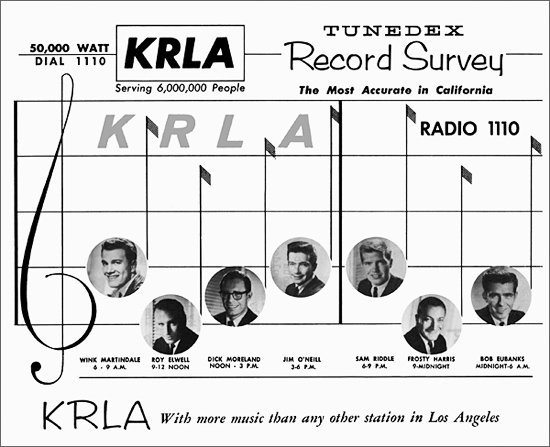
When looking back on the musical trends of the 1960s, it's pretty hard to focus on only one year. KRLA came along just at the right time to capture the rise of Motown/Tamla, surf instrumentals, girl groups like the Shirelles, the Crystals, and the Chiffons, great rhythm 'n' blues singers like Sam Cooke, Marvin Gaye, Smokey Robinson & the Miracles, the Isley Brothers...to name a few.
But the station seemed ready-made to take its place as the premier platform for the British Invasion. And the biggest group from that cornucopia of sound was The Beatles. Watching their rise up the charts is a wonder to behold. British fans had their musical revolution in 1963, but I think it's safe to say that we had an accelerated version of it throughout 1964.
Before the KRLA Beat was published regularly starting in late 1964, the only way KRLA listeners could watch the charts was to pick up a mimeographed copy of the Tunedex at their local record store or other purveyor of fine musical news, capturing wave after wave of new and old-guard music from across the pond as well as from our own shores.
KRLA chart listings are accessible on various web spaces, most notably on Bill Danning's fine Oldiesloon website. But we'd like to offer scans of the original Tunedex listings, in order of publication.
Starting January 11, 2023, we'll post a Tunedex once a week, for every week (well, except one, we're missing the first week in January) that KRLA issued its chart during the whole of 1964. Fifty years to the day, you can relive the progress of popular music as the songs of the Beatles changed everything in that most auspicious year.
KRLA Tunedex, January 11-17, 1964
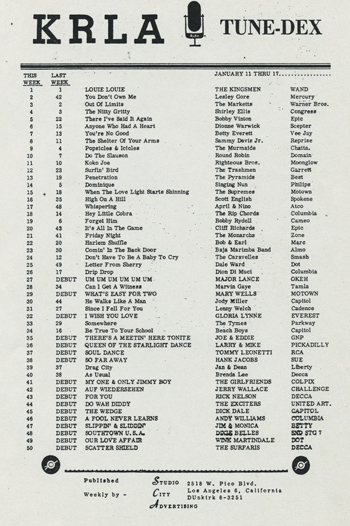
Whatever you want to say about American pop music in January 1964, it wasn't boring. But the biggest thing to hit the airwaves since Elvis wasn't yet reflected on this first available Tunedex for that month. Click the image at left for a handy-dandy PDF copy of this week's KRLA's Tunedex just as it looked fifty-nine years ago.
The music industry's reference, Billboard Magazine, had a headline that screamed "British Beatles Hottest Capitol Singles [sic] Ever." "I Want To Hold Your Hand" was the fastest breaking Capitol single since the inception of the label, leaping from nowhere to number 45 on their charts.
But KRLA's Tunedex was based on different statistical rankings that didn't reflect the reality of their own airwaves. The radio station had been playing this irresistible record multiple times an hour since the last week of December. Looking at this week's Tunedex you have a feeling that you're looking into the past, not the sudden sizzlingly-different present.
There were remnants of surf hits ("Penetration," "Out of Limits"), languid releases by the old guard ("Dion's "Drip Drop," the Beach Boys' "Be True To Your School"), and a lyrically incomprehensible number at the top of the charts, The Kingsmen's "Louie Louie," which was nevertheless an arresting tune no matter what it meant.
Seventeen new songs making their airplay debut appear on KRLA's list of the fifty top tunes of the week. None of them, remarkably, were by a British pop group. There was one English singing duo already represented on the charts. The Caravelles -- made up of Londoners Andrea Simpson and Lois Wilkinson -- were on their way down after a six-week run with their single "You Don't Have To Be a Baby To Cry," which reached its peak of number 3 on the U.S. charts in 1963. In a situation that must have seemed a bit bewildering, the Caravelles were touring the U.S. just as the Beatles were about to conquer all and were here to observe the great first wave of the British Invasion...which, as British artists themselves, they just missed.
The Caravelles ended up as a support act on February 11, 1964, when the Beatles played their first official U.S. concert at the Washington DC Coliseum. Watch it here courtesy of Vimeo.
KRLA Tunedex, January 18-24, 1964
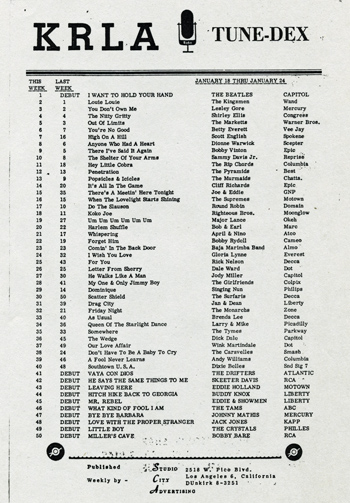
On January 16, 1964 a certain Liverpool foursome was beginning a ten-day concert series in Paris when they received a memorable telegram. It reported the unimaginable. Their current single, "I Want To Hold Your Hand," would be listed at number one in the January 25th edition of Cashbox.
Along with Billboard, Cashbox was an essential source for reporting chart hits of the day. If Cashbox said it was so...so it was.
British groups had enjoyed number one hits in America before but it had been hit-or-miss, mostly. Teenager Little Laurie London topped the American charts briefly in 1958 with the gospel-flavored "He's Got The Whole World In His Hands," and Mr. Acker Bilk's instrumental "Stranger on the Shore" reached number one in 1962.
But British artists hadn't had consistent hits in the U.S. That was a spot of bother, especially for the Beatles, whose first three UK number ones had performed dismally in the American pop milieu.
By January 18, 1964 it was clear--and had been for some weeks, if you listened to KRLA at the time--that a revolution was afoot.
KRLA's Tunedex reflects the song's importance to station listeners, and provides the strongest indication that Tunedex hit positions were based on statistics at least partly independent from Cashbox and Billboard, most likely from listener comments, either by mail or phone, about what song was grabbing their attention.
This same week, January 18-24, Cashbox reported the single at number 43, while Billboard has it at 45. On KRLA's Tunedex it was number one. KRLA scooped them all.
Click the Tunedex, above left, for an enlargeable PDF copy.
KRLA Tunedex, January 25-31, 1964
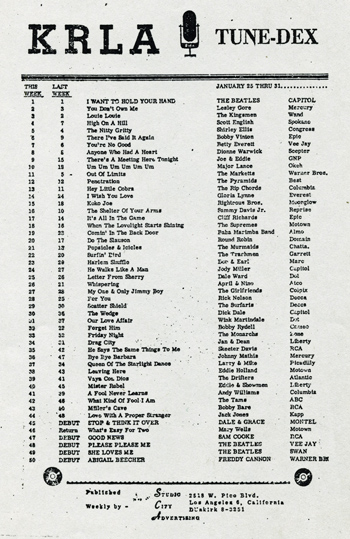
The Beatles continued to enjoy their number one position with "I Want To Hold Your Hand" this week fifty-nine years ago this week. Not reflected on KRLA's Tunedex are album chart positions. If there had been a category for such a thing, the Beatles' first U.S. LP release, "Meet The Beatles," might have shown up too.
Click the Tunedex at left for an enlargeable PDF copy.
It's an understatement to say that Capitol Records was caught a tad unaware of the demand for new Beatles tunes. "Meet The Beatles" was released on January 20, 1964, but the thirst for more Beatles tracks wasn't entirely quenched. Capitol had pressed only one single and one LP by the group.
Two independent labels, Swan and Vee-Jay, took up where Capitol dropped the ball. Note at the bottom of the Tunedex two new Beatles singles. "Please Please Me" on Vee-Jay debuted at number 48 while "She Loves You" (mistyped as "She Loves Me") debuted at number 49.
Both songs had been in the American charts before, but not at KRLA. "Please Please Me" had been played at WLS-AM in Chicago in March 1963, where it reached number 33 briefly. Dick Biondi, then at WLS but later joining KRLA, took credit (deservedly so!) for being the first American deejay to play a Beatles record in the U.S.
At WORC-AM in Worcester, Massachussetts, listeners warmed to the Swan single, but not the 'A' side. Deejays flipped it to "I'll Get You" on the 'B' side, and station fans made it the most popularly requested song on WORC in September 1963.
Lacking more musical choices, KRLA deejays played album tracks from "Meet The Beatles" in addition to available singles. That was an innovation. Album-oriented rock wasn't to evolve for another three years on FM radio, and on AM radio it was unheard-of...but KRLA showed, once again, its ability to think on its feet and give listeners what they craved.
KRLA Tunedex, February 1-7, 1964
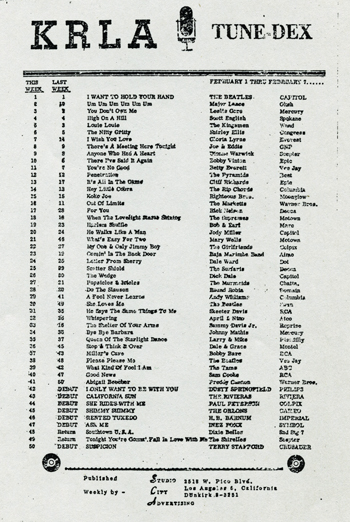
That irrepressible hit, "I Want to Hold Your Hand," still ruled the roost in the KRLA Tunedex, and two other Beatles songs were moving on up. "She Loves You" (still mistyped as "She Loves Me") advanced nineteen places to number 30, while "Please Please Me" had gone from number 48 to number 38.
Click the Tunedex at left for an enlargeable PDF copy.
Meanwhile a new British artist, Dusty Springfield, debuted and number 42 with her first U.S. single as a solo artist, "I Only Want to Be With You." In her previous incarnation she was one of The Springfields, whose release "Silver Threads and Golden Needles" reached number 20 on the American charts in 1962. Now she was branching out on her own, with a career as a successful soul singer in her future.
Round Robin, a Southern California artists of limited appeal outside the region, was having his first run of local fame with "Do The Slauson" at number 28. This dance hit was promoted on KRLA as well as on local television pop music shows, such as The Lloyd Thaxton Show, an enormously popular TV venue based on American Bandstand.
Robin was a regular performer, and the November 4, 1964 issue of the KRLA Beat mentioned Round Robin as he took his place at a KRLA-sponsored teen music show that included a mix of British and American stars, such as Gerry & the Pacemakers, Billy J. Kramer & the Dakotas, and Sonny & Cher.
KRLA Tunedex, February 8-15, 1964
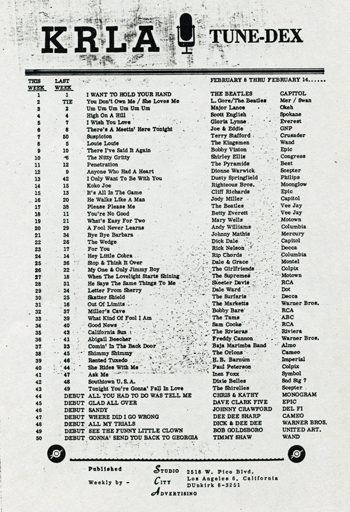
On the eve of their Ed Sullivan Show TV debut, the Beatles were riding high in the KRLA Tunedex this week, with "I Want To Hold Your Hand" still number one, but with "She Loves You" (a title the Tunedex typists still couldn't spell properly) tied for number 2 alongside Leslie Gore's "You Don't Own Me."
The Fabs' first big hit in England, "Please Please Me," has now climbed to number 17 on the chart. Note that the record label was Vee Jay, not Capitol. Vee Jay had secured the rights to distribute "Introducing the Beatles" in 1963, an LP based on the foursome's first British album "Please Please Me."
Not a company willing to rest on its laurels, Vee Jay quickly set about releasing "Please Please Me" as single to capitalize (not a pun) on the group's enormous popularity. Capitol was irritated but couldn't do much about it.
There were some nice surf instrumentals still in the Tunedex, such as The Pyramids's "Penetration" and The Markett's "Out of Limits" (originally titled "Outer Limits" until a certain television studio threatened to sue for copyright infringement). But sneaking into the list was a group whose manufactured "rivalry" with the Beatles made news in music and teen magazines of the time. The Dave Clark Five debuted with "Glad All Over" at number 45.
Click the Tunedex at left for an enlargeable PDF copy.
KRLA Tunedex, February 15-21, 1964
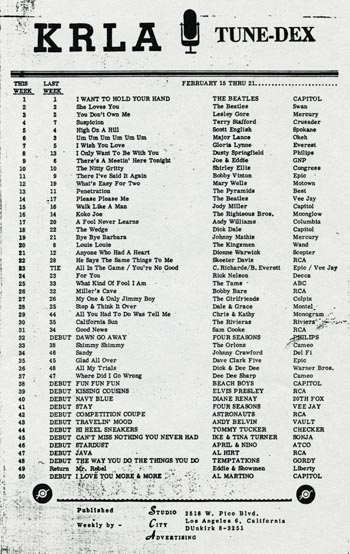
KRLA's tappy Tunedex typists finally managed to spell the number 2 song correctly this week. Instead of "She Loves Me" it's now properly "She Loves You," while the Fabs' "I Want To Hold Your Hand" is at number one for the fourth week. "Please Please Me" continued its climb and is comfortably lodged at number 14.
The old guard is still strongly represented. Rick Nelson's "For You" was bravely hanging on to number 24 on the Tunedex, with more mainstream singers like Al Martino and Johnny Mathis contributing their standards to the radio sounds of this week fifty-nine years ago.
Two groups whose origins were in the early 1960s had a particularly strong showing this week. The Beach Boys, whose harmonies were a big part of their charm, moved on from surf to cars with "Fun, Fun, Fun" debuting at number 38.
The Four Seasons, whose roots were predominantly in doo-wop, had two new songs this week: "Dawn (Go Away)" at number 32, and a cover of the old Maurice Williams & the Zodiacs' tune, "Stay," at number 41.
And notable on this week's Tunedex is a song written by (the late, as of this writing) Burt Bacharach and his co-writer Hal David, "Anyone Who Had Heart," a song given to Dionne Warwick and issued on Scepter Records.
Recorded in Detroit in November 1963, it became a top ten for Warwick in January 1964 and was this week on its way back down the chart but still a strong airplay contender. Bacharach used his customary exploration of time signatures in this tune, navigating from 4/4 to 5/4 to 7/8. It was perfectly suited to Warwick.
The Beatles may have dominated the charts this week, but they couldn't keep rival bands from having their say.
Click the Tunedex at left for an enlargeable PDF copy.
KRLA Tunedex, February 22-28, 1964
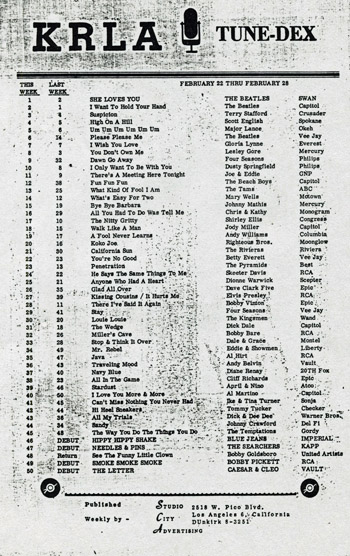
Seven songs represent the UK in this edition of the KRLA Tunedex. The Beatles, of course, hold the top two, where "She Loves You" switches places with "I Want To Hold Your Hand" this week, with "Please Please Me" still climbing at number 6.
Dusty Springfield's "I Only Want To Be With You" holds firm in the top ten, and the Dave Clark Five's "Glad All Over" creeps up from number 31 to number 26.
Two new British acts have debut singles this week, the Swinging Blue Jean's "Hippy Hippy Shake" (a cover of the American Chan Romero's minor hit, and a great favorite of Paul McCartney's when he sung it at The Cavern Club in Liverpool). Also seen is the debut of The Searchers, covering Jackie De Shannon's "Needles and Pins."
Some mainstream singers also made the charts this week fifty-nine years ago. Andy Williams with "A Fool Never Learns," Al Martino with "I Love You More & More," and April Stevens and Nino Temple (brother and sister) released a version of the 1927 Hoagy Carmichael hit "Stardust," which experienced a plethora of revivals in the 1940s. It didn't fit in entirely smoothly with the rock-and-roll oriented Tunedex, but it was much appreciated by those who hoped that music would make a U-turn into the past.
Caesar and Cleo picked a bad week to start their recording career! Their debut single, "The Letter" on Vault Records, squeezed into the Tunedex at number 50 and went pretty much nowhere. But never mind. With a name change to Sonny & Cher, they'd eventually make their mark in mid-sixties pop music.
Click the Tunedex at left for an enlargeable PDF copy.
KRLA Tunedex, February 29-March 6, 1964
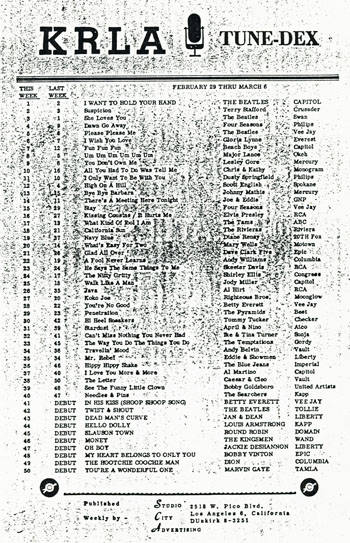
The Beatles had gone home...but clearly they weren't forgotten.
This week's Tunedex includes four Beatles hits, three in the top ten (with "I Want To Hold Your Hand" still at number one). "Twist and Shout" on Tollie Records debuted at number 42. Once again Capitol Records was asleep at the wheel.
Not so our perspicacious surfer boys! For the cool California winter, musical themes were turning from the beach to the byways and highways. The Beach Boys' "Fun, Fun, Fun" was a cheerful paean to car culture, while Jan & Dean's darkly theatrical "Dead Man's Curve" made its debut at number 43 this week, a warning to all who take the roads for granted.
While Elvis Presley's indomitable reign at the top of the charts was mostly a thing of the past, his "Kissin' Cousins" (from the film of the same name) still made a respectable showing at number 16, up from number 27 the previous week.
Eddie & the Showmen continue to make waves with their surf hit "Mr. Rebel," allegedly a tip of the hat to KRLA deejay Reb Foster. Eddie Bertrand, the lead guitarist, was a veteran of the Bel-Airs and wrote the tune himself for his new group The Showmen. "Mr. Rebel" was their biggest hit.
Song titles seemed awfully repetitive in this week's Tunedex, you may notice. Please, please, um, um, shoop shoop, bye bye!
Click the Tunedex at left for an enlargeable PDF copy. Sorry about the quality, it's the best that's available.
KRLA Tunedex, March 7-13, 1964
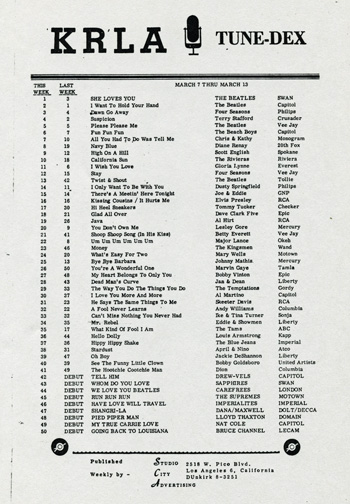
What better way to be knocked out of the long-held number one spot...with your own song!
Two of the Beatles' biggest hits exchanged places this week in the KRLA Tunedex, with "She Loves You" in the number one position for the first time, with "I Want To Hold Your Hand" now number two, "Please Please Me" at number five, and "Twist and Shout" rocketing up from number 42 to number 13.
The Carefrees "We Love You Beatles" was strictly a novelty tune, based on the song from the hit musical "Bye Bye, Birdie" called "We Love You Conrad," but it showed some traction in its debut at number 44. And the Beatles' "rivals" (a rivalry made up mostly in the imagination of pop music publicists), the Dave Clark Five, have moved up to number 18 from number 21.
Interesting to note that there was plenty of room for mainstream middle-of-the-road music in the Tunedex during that week. There's still a fine showing of Motown and R&B hits, but Johnny Mathis, Al Martino, and April Stevens & Nino Temple represent the old standards from days of yore. Groups with guitars were on the way out...weren't they?
It's remarkable that Elvis Presley, whose chart-topping days were behind him, was still able to score with a track from his newest film "Kissing Cousins." It wasn't the most influential of his tunes, not by a longshot, but with everything happening from so many different musical realms -- Motown, the British Invasion, mainstream -- Elvis was still a clear contender for chart action.
KRLA Tunedex, March 14-20, 1964
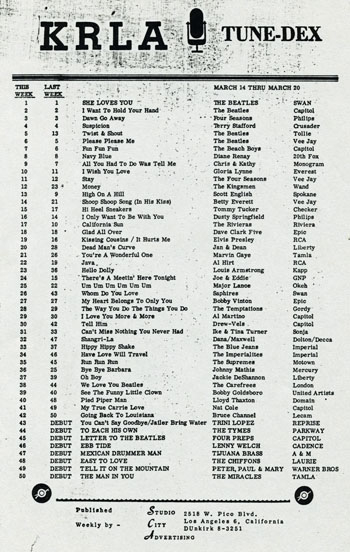
This week fifty-nine years ago it was getting a mite crowded in the top ten. The Beatles (of course) had four singles represented, rubbing shoulders with The Four Seasons' powerhouse of a hit, "Dawn Go Away" and the Beach Boys' "Fun, Fun, Fun."
Not one but two Beatles novelty songs were on the hit parade this week. The Carefrees' "We Love You, Beatles" was climbing higher, and now the Four Preps decided to get into the act with "Letter to the Beatles" at number 46 (and on the Capitol label, which finally was realizing how to get more out of a good thing). I wonder what was in that letter? A suggestion that the Fabs p olitely get back to their own English charts and leave America alone?
Local Los Angeles TV host Lloyd Thaxton, whose show on KCOP was something of an "American Bandstand" knock-off and very popular in Southern California, made his own voice heard at number 40 with "Pied Piper Man." Otherwise it's more of the same, with very little change in the Tunedex from the previous week.
For those who want to keep score, there are at least three musical artistes in this week's Tunedex who once shared a venue with The Beatles. Bruce Channel at number 42 with "Going Back to Louisiana" headlined with the Beatles in June 1962 at the Tower Ballroom in New Brighton, back when Pete Best was still a member of the band (just barely).
Chris Montez teamed up with Kathy Young on "All You Had tDo Was Tell Me" (number 9 this week). With Tommy Roe, Montez was part of the March 1963 English tour where the Americans were supposed to be headlining, but their supporting act was already enjoying a number one hit on the British charts.
And Trini Lopez, debuting with "You Can't Say Goodbye" at number 43, had recently finished a series of appearances with the Fabs in January and February 1964 at the Olympia Theatre in Paris. They opened for Trini. At the end of their gig they headed to America for a new type of conquest.
Click the Tunedex above for an enlargeable PDF copy, and happy reminiscing!
KRLA Tunedex, March 21-27, 1964
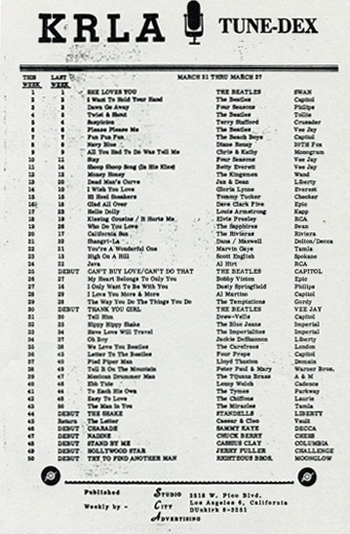
A scant year earlier, in March 1963, Tommy Roe and Chris Montez were headlining a tour of the UK with a secondary act called, not surprisingly, The Beatles. Those who remembered that tour found Tommy Roe a decent rock-and-roller but complained about Chris Montez, who seemed to have developed a penchant for taking off his shirt and tie while performing. In March 1964 Chris Montez's last hit (with co-singer Kathy Young), "All You Had To Do Was Tell Me," kept a tenacious hold in the chart listings.
This week fifty-nine years ago there were seven Beatles songs in KRLA's top fifty tunes, if you count both sides of "Can't Buy Me Love/You Can't Do That" in its debut at number 25.
The old guard of rock and roll is still ably represented by the likes of Elvis, The Four Seasons, The Beach Boys, Jan & Dean, plus Motown stalwarts like The Miracles, The Chiffons, and Marvin Gaye, but look who else is comin' up slowly: Chuck Berry.
After a few years out of the recording studio due to an unfortunate encounter with the law, Chuck was back in form with "Nadine," debuting at number 47. The Beatles' idol was sharing the stage with them, virtually speaking.
The most unexpected record appearance of the week was by Cassius Clay, better known as Muhammad Ali the prize fighter. A year earlier he had recorded an LP called (not surprisingly) "I Am The Greatest," and this cover of the Ben E. King hit entered the charts, riding on the wave of Clay's recent routing of Sonny Liston. It was a curiosity at best.
Click the Tunedex at left for an enlargeable PDF copy.
KRLA Tunedex, March 28-April 3, 1964
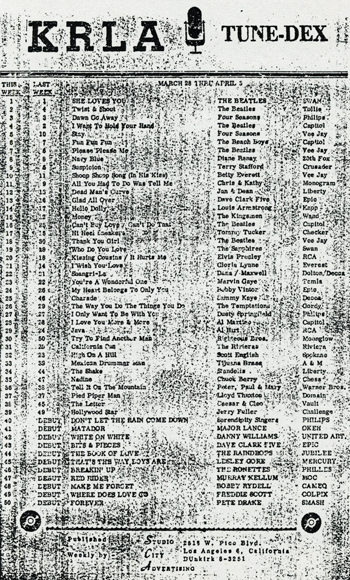
Seven...count 'em, seven Beatles songs are in the top twenty this week fifty years ago at KRLA. On the national charts the following week, the Beatles were about to attain a ranking that no one previously had ever seen. They were about to hold the top five positions in the national singles chart.
Of course the Dave Clark Five were still major players at this point with "Glad All Over" at number 13, but the rest of the chart listings exhibit very little change. There are tunes by the Beach Boys, the Four Seasons, plus several middle-of-the-road instrumentals: Al Hirt's "Java," Sammy Kaye's "Charade," and the Tijuana Brass with "Mexican Drummer Man."
The duo that would become Sonny & Cher made a valiant attempt this week with "The Letter," billed as Caesar & Cleo on Vault Records. It was a throwback in style and sentiment, as was another tune on this week's Tunedex: "Pied Piper Man" by local Los Angeles TV host Lloyd Thaxton.
This was mostly a recitation of popular dances of the past few years and very little actual singing by Thaxton himself in favor of hired background singers. It was as if the musical strategy of the time was to look backwards instead of forwards. But revolutions never seem real while you're riding the first wave.
Sorry for the low quality of this week's image. You can still click the Tunedex at left for an enlargeable PDF copy.
KRLA Tunedex, April 4-10, 1964
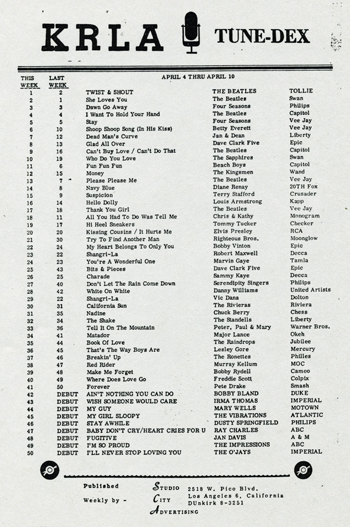
You'd have to read the April 4, 1964 issue of Billboard to realize what a red-letter day this was fifty-nine years ago.
What happened on the singles charts that day had never happened before: one group had the top five singles in the hot 100 records for the week. Any doubt about what group we mean? Not surprisingly, it's a feat that has never been replicated.
KRLA's Tunedex was compiled differently, so songs appeared in their own unique configuration. The Beatles still had seven songs in the top twenty as KRLA rated them, which wasn't such a bad accomplishment, comparatively.
The Dave Clark Five's "Glad All Over" had begun its rapid ascent to the top ten this week (and doing equally well on the national Billboard charts too). The band with the Tottenham Sound also offered a second single, "Bits and Pieces," coming up at number 23. Otherwise the Tunedex is little changed, with a handful of songs from previous weeks jockeying for position, s ome up, some down.
Keep an eye on Mary Wells' "My Guy," debuting this week at number 44. Big things were to come from this prolific Motown singer and songwriter.
Click the Tunedex above for an enlargeable PDF copy.
KRLA Tunedex, April 11-17, 1964
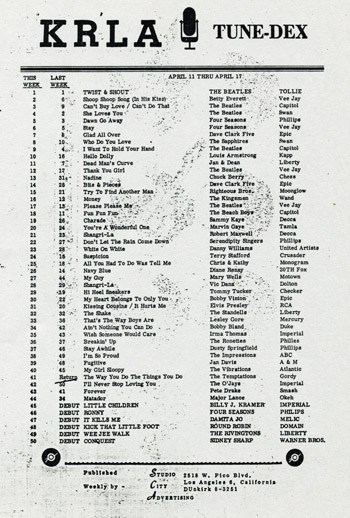
This week, fifty-nine years ago, we have a new British Invasion band: Billy J. Kramer and the Dakotas. They debut at number 45 on the KRLA Tunedex.
In retrospect it's not really a surprise. Brian Epstein was their manager, and anything the Beatles' manager had in his stable of stars would be a sure thing. The KRLA program manager must've had no hesitation adding "Little Children" to the KRLA playlist rotation.
In the Tunedex this week things are beginning to move in an interesting fashion. The Dave Clark Five and their powerhouse debut single "Glad All Over" have moved into the top ten, mirroring the upward movement they enjoyed in the national Billboard charts.
Two old stalwarts -- one much older than the other -- also see some significant changes in their chart status this week. "Hello Dolly," an unanticipated hit by jazz great Louis Armstrong, has moved into the number ten slot. And Chuck Berry, back in the swing with "Nadine," has catapulted from number 31 to number 13 this week.
Odd to think that at this point fifty-nine years ago the other big names in the British Invasion, such as the Animals, Herman's Hermits, and the Rolling Stones, had yet to grace the American charts. We wouldn't have long to wait to hear them.
Click the Tunedex at left for an enlargeable PDF copy.
KRLA Tunedex, April 18-24, 1964
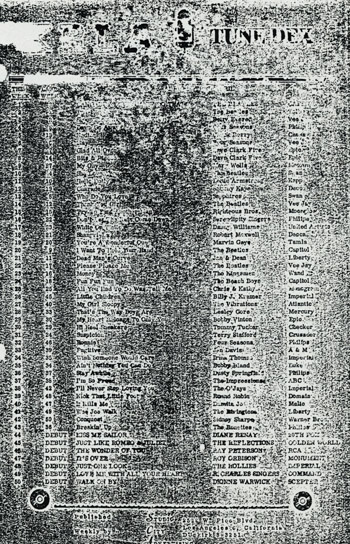
I didn't promise that every week would be smooth sailing. Time has been indifferent to this week's Tunedex. You might even say it's been brutal.
What we appear to have here is the Dead Sea Scroll equivalent of the April 18-24, 1964 Tunedex. Calling all archaeologists and philologists! If you have a better copy would you consider sharing it?
Actually since you can't read it, please just go over to Oldiesloon's website and take a look at the nice transcription for this week. It's much easier on the eyes.
We still have a fair number of Beatles songs on the playlist, plus two Dave Clark Five singles, not to mention the old and young regulars. Sharp-eyed readers may notice that two artists on the Tunedex actually played live on stage with the Beatles in 1963.
One was Chris Montez, whose hit with Kathy Young, "All You Had To Do Was Tell Me," is still hanging on to the number 25 position for some reason that is simply inexplicable.
New this week is Roy Orbison's single "It's Over," charting at number 47. Roy was the headliner when the Beatles supported his English tour in May and June of 1963. They were understandably in awe of him at that point, and Roy was there to see some of the earliest flowering of British Beatlemania, which wouldn't hit full force in England until later that year.
Wonder if he found it the least bit ironic to be sharing the bill, so to speak, with them again, this time on the American charts?
Also debuting this week is Dionne Warwick's "Walk On By," a composition by Burt Bacharach and Hal David, enhanced by Dionne's haunting vocals. It's a lyrical theme that was popular in past hits (Patsy Cline's "I Fall to Pieces" comes to mind) but this arrangement is striking.
We'll return to better-quality Tunedex charts next week, that's a promise.
KRLA Tunedex, April 25-May 1, 1964
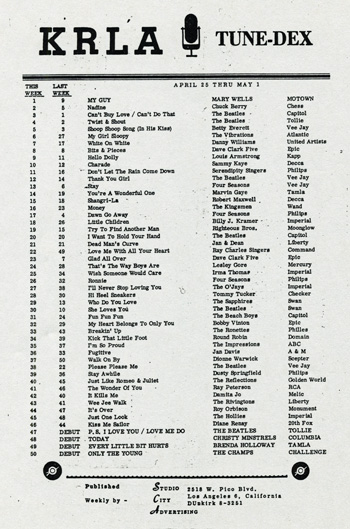
For the first time in over four months the Beatles didn't have a number-one hit on the Tunedex this week, fifty-nine years ago. But their successor is undoubtedly someone they admired greatly, fans of Motown as they were. Mary Wells had the biggest hit of her career this week with "My Guy" reigning supreme at the top of the Tunedex.
Also debuting at number 49 this week was an impassioned rendition by Brenda Holloway, just eighteen, with "Every Little Bit Hurts," a song she'd first recorded two years earlier. This time it hit the charts. Holloway was also a songwriter, with Blood, Sweat & Tears covering her own composition "You Made Me So Very Happy" in 1969.
Holloway and Wells both shared the distinction of being asked to accompany the Beatles on their 1965 tour, Wells for the UK tour, Holloway for the American version. But just a few years later Holloway left Motown, dissatisfied with both the label itself and her management.
Click the Tunedex at left for an enlargeable PDF copy. It's readable this week!
Chuck Berry had the number two spot with "Nadine," a song every bit as good as his classics in days of yore.
The Beatles still have seven songs on the charts if you count the double-sided debut single "P.S. I Love You/Love Me Do" on Tollie Records, billed the reverse of the way it appeared on Parlophone in the British charts over a year earlier. KRLA favored "P.S. I Love You" as the song of choice and played it incessantly (so it seemed to listeners at the time).
Not to be outdone, the Four Seasons had three hits on the Tunedex this week: "Stay," "Dawn, Go Away," and "Ronnie." That's not such a bad accomplishment either.
KRLA Tunedex, May 2-8, 1964
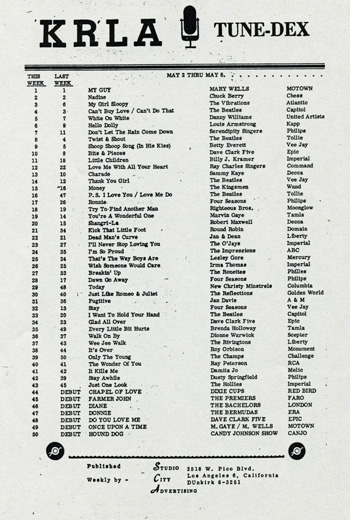
With this week fifty years ago we entered our fifth month of the British Invasion. What's remarkable is how many groups don't yet show up. Where are the Rolling Stones? The Animals? The Kinks?
No sign of them yet, but the First Wave is still ably represented: the Dave Clark Five, Dusty Springfield, Billy J. Kramer and the Dakotas, the Hollies...plus four guys from Liverpool taking a break from the top of the chart.
Click the Tunedex at left for an enlargeable PDF copy.
Songwriter Bert Berns ("Twist and Shout," "Under the Boardwalk") must have been amused at having two songs in the top ten this week, one version by those self-same Liverpool lads. Credited as Bert Russell with co-writer Wes Farrell, their "My Girl Sloopy" by Los Angeles' own R&B group, The Vibrations, had reached number 3 this week.
Debuting this week at number 45 was another local group, The Premiers from the L.A. suburb of San Gabriel, with their one-hit wonder, "Farmer John." A cover version of Don & Dewey's original hit, The Premiers were hitbound on the national charts with their attempt to re-create the languid, irresistible style of The Kingsmen's recent hit, "Louie, Louie." You can watch The Premiers perform their hit via Youtube.
KRLA Tunedex, May 9-15, 1964
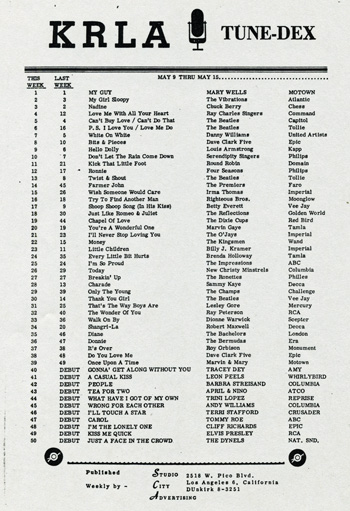
Fifty years ago this week the music scene was beginning to appear a lot more American. True, we still see chart entries by The Beatles, the Dave Clark Five, Billy J. Kramer and the Dakotas, as well as the Irish group The Bachelors with their breakthrough single "Diane."
One surprise, but not a long-lived one: Cliff Richard, who had risen to the top of the British charts with his enviable debut in 1960, "Move It," has a debut single on the KRLA chart at number 48, "I'm the Lonely One."
A few years earlier, British bands (including the Beatles) wished they could find the magic key to equal Cliff's fame. Now one group led the way, and it's a likely hypothesis that without The Fabs paving the road, Cliff wouldn't have been able to touch the American charts.
R&B and mainstream American pop dominate the Tunedex this week with good showings by The Vibrations, Irma Thomas, Marvin Gaye, and Brenda Holloway. The old guard is there too: Chuck Berry was doing very well with "Nadine" at number 3, while Roy Orbison's "It's Over" continued to see airplay. Our old pal Elvis Presley had a debut single this week fifty years ago, "Kiss Me Quick" on RCA. It wasn't destined to be a big seller.
One to watch: Broadway chanteuse Barbra Streisand's "People," from the musical "Funny Face," has just debuted at number 42.
Click the Tunedex at left for an enlargeable PDF copy.
KRLA Tunedex, May 16-22, 1964
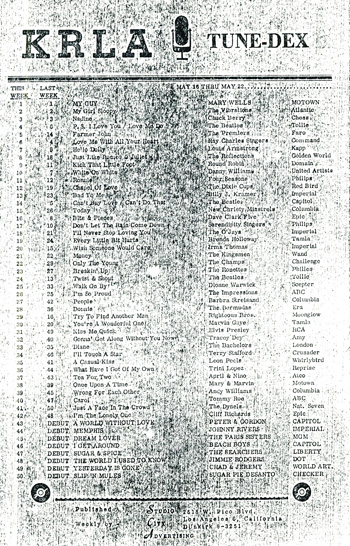
Sorry about the quality of this week's Tunedex. You can peruse a transcription of the original Tunedex for this week at Oldiesloon's site if you prefer.
There are several interesting things about the list this week, most notably the arrival of reinforcements for the British Invasion. Take a look at the debut section of the Tunedex.
The Searchers' "Sugar & Spice" debuts at number 47, but two new duos appear as well. Peter & Gordon's "A World Without Love" appears at number 43 this week fifty years ago on the Capitol label. A couple Beatles connections should be noted.
The song was a Lennon-McCartney tune, one the Fabs gave away to the duo and wouldn't record themselves. (John apparently collapsed in laughter every time Paul would sing him the line "Please lock me away," rendering the song useless for adding to the Beatles' repertoire.) Also Peter Asher was the brother of British actress Jane Asher, whom Paul was then dating.
Another new British duo was Chad & Jeremy, whose folky-pop rendition of "Yesterday's Gone" made an impression at number 49. Both Peter & Gordon and Chad & Jeremy would continue to see chart success for the next few years.
Not much changed at the top of the charts, with Mary Wells, The Vibrations, and Chuck Berry still appropriating the number one, two, and three positions.
Click the Tunedex at left for an enlargeable PDF copy.
KRLA Tunedex, May 23-29, 1964
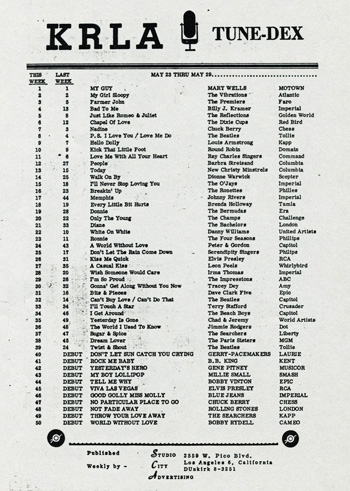
Although the top two songs are unchanged in this week's Tunedex, a couple songs are making notable leaps upward. Click the Tunedex at left for an enlargeable PDF copy.
One, by Billy J. Kramer and the Dakotas, is "Bad To Me." Billy and his group were part of Brian Epstein's stable of stars, and an association with the Beatles (especially covering one of their tunes) never hurts. London duo Peter & Gordon were enjoying some of the same effect with their Lennon-McCartney hit "A World Without Love," appearing at number 24 this week, up from number 43.
It was rare at this time to find an American artist covering a Beatles song, but Bobby Rydell was perspicacious enough to release his own rendition of "A World Without Love" on the heels of Peter & Gordon's version. Rydell's cover debuted at number 50 this week, and as I recall KRLA gave it a lot of airplay at the time.
It's worth noting that KRLA had also promoted a very early Beatles song by the American singer Del Shannon, who touched number 32 in July 1963 with "From Me To You." Del had toured with The Beatles briefly in 1963 and brought this cover of their number-one hit Stateside during a time when the airwaves were awash in surf songs and twangy instrumentals.
Other songs on the upswing: Barbra Streisand's "People" has move from number 27 to 12 this week fifty years ago. And Johnny Rivers' live cover of Chuck Berry's "Memphis" has rocketed up the chart from its debut position last week at number 44 to an impressive number 17 this week.
The second wave of the British Invasion is burgeoning in the debut section of the Tunedex. Five songs by British acts were all new to the KRLA playlist this week. Merseysiders Gerry and the Pacemakers introduced "Don't Let The Sun Catch You Crying" at number 40 while The Searchers offered "Don't Throw Your Love Away" at number 49.
Millie Small's "My Boy Lollipop" at number 43 was one of the first, if not the very first, appearances of bluebeat music on the American charts, an ancestor of reggae. Billboard Magazine for May 16, 1964 noted the popularity of what they called "the Blue Beat dance, originally inspired by a Jamaican native dance called the Ska."
Millie Small, sometimes styled just Millie, was actually from Jamaica but had recorded this particular tune in London where she was now based and where she had been offered a showcased performance on The Beatles' April 1964 television special "Around the Beatles."
And at number 48: the American debut of The Rolling Stones, a development also trumpeted by the May 16, 1964 issue of Billboard. "Not Fade Away," a cover of the Buddy Holly hit, had surged up the British charts and plans were afoot to prepare the American public for the second coming of British rock. According to Billboard this would include wallet-sized fan club photos of the Rolling Stones, t-shirts, a June tour of the U.S., and a film to be written by "Oliver"'s Lionel Bart. The film never happened, although the tour was real enough. Turns out the Stones were quite capable of holding their own on the American music charts, as they'd demonstrate in the months to come.
KRLA Tunedex, May 30-June 5, 1964
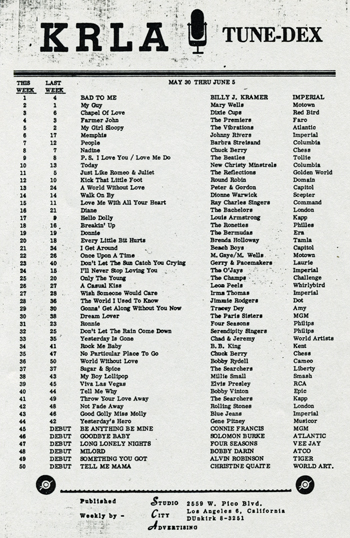
British groups continued to thrive this week fifty-nine years ago on the pop music charts. The Searchers, the Rolling Stones, Gerry & the Pacemakers, Peter & Gordon and Chad & Jeremy all continue their upward march, while the Fabs themselves continue their top-ten reign with "P.S. I Love You," which KRLA treated as if it were the A side of the single.
A new appearance this week besides British bluebeat singer Millie Small is Christine Quaite, a Yorkshire lass whose career seemed to mirror that of the much more popular Helen Shapiro. Like Shapiro, Christine was a schoolgirl in England when she began to release pop hits, but the first brush with fame in America was "Tell Me Mama," which debuted on the KRLA Tunedex at number 50.
There's a chance that Chad & Jeremy's initial success in the States had something to do with the release of "Tell Me Mama." Both acts were signed to the World Artists label. This was the end of the line for Christine, but Chad & Jeremy had a successful future ahead.
With the continued dominance of groups from across the pond it's remarkable that more established stalwarts of rhythm and blues could make their presence known. Irma Thomas, "the Soul Queen of New Orleans," reached number 27 with "Wish Someone Would Care," while B.B. King's "Rock Me Baby" clocks in at number 34 this week and Solomon Burke debuts at number 48 with "Goodbye Baby."
And it's not all rock, rhythm 'n' blues. Two popular show tunes are in the top twenty, Barbra Streisand's "People" and Louis Armstrong's "Hello Dolly," and The Ray Charles Singers offer a tune that was purely middle-of-the-road fare, "Love Me With All Your Heart," which on MOR radio stations was actually rated number 1. The nature of pop music was changing but in the Tunedex there were remnants of its more mainstream past at every turn.
Click the Tunedex above for an enlargeable PDF copy.
KRLA Tunedex, June 6-12, 1964
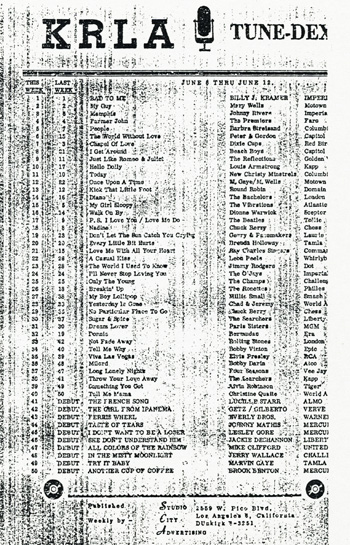
In June 1964 music business magazines like Billboard were realizing -- to their horror -- that there was a problem in the land of rock-and-roll. For the first time British acts were seemingly more popular in the U.S. charts than American home-grown acts. And if that wasn't enough, British charts were now swinging away from American dominance to English singers. The nerve!
Billboard called it "the Yankee-Redcoat competition." Capitol vide-president of A&R Voyle Gillmore was quoted in the June 13, 1964 issue of Billboard affirming his belief that American pop acts would once again rule the roost in the States, "although Gillmore has nothing but praise for the Beatles' artistic abilities." Nice of him to recognize what the Beatles' artistry had done for Capitol's record sales in the first half of 1964.
This week's Tunedex doesn't indicate any noticeable imbalance in the distribution of acts of various nationalities, and in fact a spokesperson for the English Songwriter's Guild helpfully pointed out to Billboard that only a third of the artists on British radio were, in fact, British. Over half were American. Why such fervor?
Of course, as we know now, fifty-nine years ago at this point in time the tides were turning, and the American charts would never be quite the same as they were before the British Invasion. Those halcyon days of Bobby Vinton and Johnny Mathis weren't vanishing into the ether, rather they were showing up on more mainstream music charts where middle-of-the-road singers continued their successful foray in music. But rock-and-roll charts like KRLA's Tunedex would continue to plot the sea change in radio-listening and record-buying habits for several years to come.
Click the Tunedex above for an enlargeable PDF copy, and enjoy this week's listing.
KRLA Tunedex, June 13-19, 1964
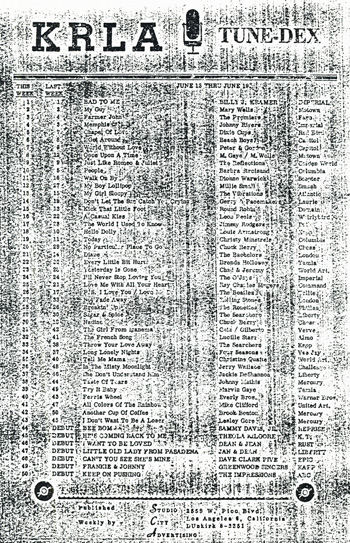
This is one week where we're able to grab the flavor of KRLA's on-air style right at the time this Tunedex was published 59 years ago. We have an aircheck from this exact week!
Casey Kasem's afternoon show mentions Dick Clark's Caravan of Stars then touring the U.S., which allows us to tentatively date this aircheck to mid-June 1964. You'll hear some of the same tracks (in "scoped" or telescoped format) that appear in this week's Tunedex.
Round Robin's current hit "Kick That Little Foot" was number 15 on the Tunedex. Robin was purely a Southern California artist but he was about to be included in the Dick Clark traveling show, which would improve his visibility and give him a shot at more widespread fame.
Dean Martin's "Everybody Loves Somebody Sometime" was a new release and hadn't yet charted, but as usual KRLA offered up some mainstream fare for more mature KRLA listeners, and of course it would go on to be one of Martin's biggest latter-day hits. Same for Bobby Freeman's "The Swim," which Casey debuted ahead of its formal appearance on the charts, noting that it was currently a dance crazy more popular in Northern California.
"Bad To Me" by Billy J. Kramer and the Dakotas was number one this week, as it was the previous week, so it's appropriate that it might show up at least once an hour. The Ray Charles Singers' "Love Me With All Your Heart" was beginning its downward trend but at number 25 on the Tunedex it still merited airplay.
Casey played an oldie by Mike Clifford, "Close To Cathy," which had been his biggest hit in 1962. Mike's current chart offering, "All Colors of the Rainbow," was at number 41 this week, up from 47 the previous week.
Nothing shifted much between last week and this, but bigger things were coming down the pike, music-wise, and they're all worth the wait.
Click the Tunedex at left for an enlargeable PDF copy. Quality of these original photocopied chart listings vary from week to week, unfortunately, but to read a cleaner copy try the version at Oldiesloon's site.
KRLA Tunedex, June 20-26, 1964
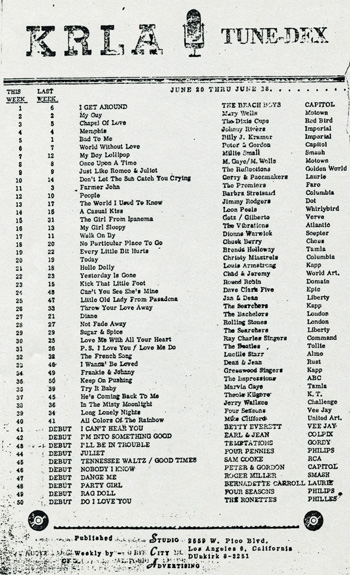
Even with nine British Invasion records on the Tunedex, American singers show that they're just as strong as ever. The Beach Boys had been charting for three years by this time, and not surprisingly, on the cusp of the summer of 1964, they're number one again with "I Get Around."
Capitol Records was having a very good year!
Peter & Gordon as well as The Searchers each had two songs in the Tunedex this week fifty years ago, an uncommon accomplishment. We're between Capitol Beatles releases this week with only Tollie's "P.S. I Love You/Love Me Do" holding its own at number 31.
Of course KRLA was giving airplay to plenty of Beatles songs not listed on the charts, becoming one of the earliest radio stations to play album-oriented rock and roll. With a listenership that couldn't get enough of the Fab Four there was no other alternative. This would lead to a very curious Tunedex entry in about a month, just to give you a heads-up.
One interesting chart entry this week debuting at number 42 was Earl Jean's "I'm Into Something Good," a Goffin-King composition. Earl-Jean McCrea, originally one of The Cookies (whose "Chains" had so enchanted the Beatles), enjoyed a modest success with the song before it would see a reprise (and become a much bigger hit) as the first chart entry for the British group Herman's Hermits. The Goffin-King writing team was one of the best of the era, with their accomplishments duly noted in this New York Times article.
Click the Tunedex at left for an enlargeable PDF copy.
KRLA Tunedex, June 27-July 3, 1964
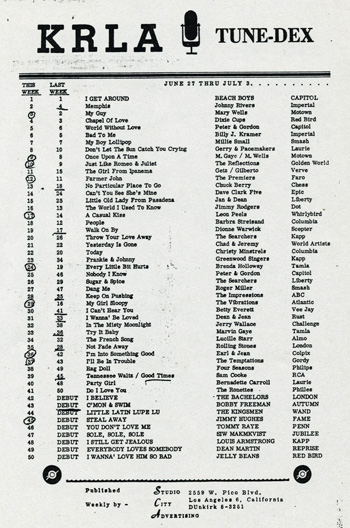
Peculiar situation on the Tunedex this week: for the first time in half a year, there were no songs by the Beatles on the charts.
Plenty of British Invasion representation, of course, even several Lennon-McCartney tunes, but for the Fabs it was a brief respite in chart domination. United Artists was just about to release the soundtrack to their first film, "A Hard Day's Night," while Capitol would scramble to release individual songs as singles so they could get into the act.
Even Vee-Jay, the label that released a Beatles LP when Capitol refused to do so, had assembled an EP (extended play) release with four tracks from their "Introducing the Beatles" album...which their advertisement in Billboard claimed would chart as a single.
Otherwise this week fifty-nine years ago it was pretty much a rehash of the previous week, with the Beach Boys still firmly ensconced at number one with "I Get Around."
Behind the scenes things weren't so sanguine for the radio station itself. The FCC had yet to rule on whether KRLA would keep its broadcasting license in the wake of on-air contest fraud and falsified station logs in 1959 and 1960, both serious issues. The station was still pulling in substantial yearly revenue of $1,500,000, so its market value was well understood, and ironically it had been increasing its worth every year since 1962 when the FCC first refused to renew KRLA's license.
As if that wasn't enough, KFAB in Omaha and KSDO in San Diego were both complaining that KRLA's signal had been stepping all over theirs -- all three shared the 1110 spot on the dial. In fact, whenever KRLA went off the air at midnight Sunday for transmitter maintenance, KFAB popped up large as life and twice as lovely, so it's debatable who was interfering with whom. But no matter how unsettled at the time, KRLA never lost its vim and vigor. With all the deejay enthusiasm on the air, regular listeners were mostly oblivious to the possibility that some other entity (likely far less rock-and-roll friendly) could take their beloved station away.
Click the Tunedex above for an enlargeable PDF copy. And no, it wasn't me who made marks on this week's copy, it was someone in the distant days of yore. Sorry for this. One does what one can.
KRLA Tunedex, July 4-10, 1964
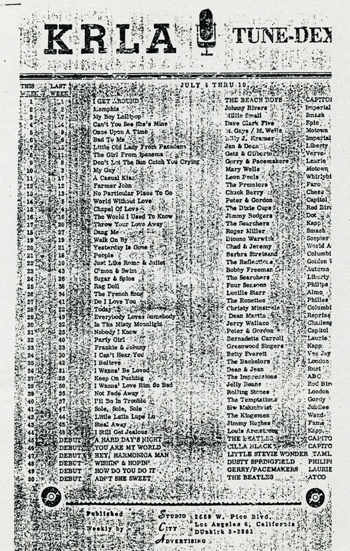
This week fifty-nine years ago the second wave of the British Invasion hit our shores, and hit hard. There are thirteen (count 'em!) British singles in the Tunedex this week.
A most notable debut is "A Hard Day's Night," the Beatles' tune from the about-to-be-released film of the same name. If you have any doubts about the impact this film had at the time, read a few reviews by the cynical and hardened gaggle of film critics of the day. No less than Bosley Crowther, writing for the New York Times, called it "audio-visual poetry." The film as well as the song were breakthroughs for the time.
A Beatles peculiarity this week: Atco Records wanted to get into the action so they licensed a certified oldie, "Ain't She Sweet," including three of the four Fabs plus their previous drummer, Pete Best. This single was recorded in Germany in 1961 by Bert Kaempfert during sessions that employed the Liverpool foursome as backing musicians to British singer Tony Sheridan. But in this particular recording a twenty year old John Lennon handles the vocals most ably, rocking up the song's antique jazz-age origins. It debuts at number forty-nine.
Debuting at number 49 was a song originally meant for the Beatles, penned not by them but by songwriter by Mitch Murray. They were reluctantly coaxed to record it but the results were less than sterling. Challenged by their producer George Martin to come up with something better, they did: a little ditty called "Please Please Me," which became their first British number one. Recorded by Gerry and the Pacemakers, "How Do You Do It" is everything that George Martin envisioned...and it was a number one for Gerry and the Pacemakers in the UK.
There were plenty of American fireworks on the charts this week too. The Beach Boys held steady with "I Get Around" at number one, while Jan and Dean's "Little Old Lady from Pasadena" was heading down Colorado Boulevard at number seven. Johnny Rivers' cover of Chuck Berry's "Memphis," recorded live at the Whisky-A-Go-Go, was stable at number two. It was the nature of the time that Chuck Berry, a certified first-state rock-and-roller -- who had inspired both the Beatles and the Rolling Stones if not countless other British music-makers -- fell comfortably into this musical milieu with "No Particular Place To Go" at number thirteen.
As always, click the image above left to enlarge the Tunedex, and enjoy your Fourth of July!
KRLA Tunedex, July 11-17, 1964
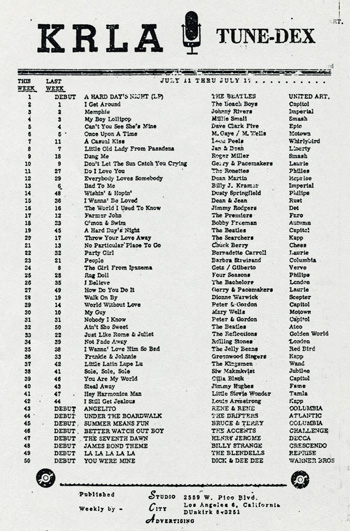
Hey, this is supposed to be the singles chart!
True, but what we have at number one on the Tunedex this week is a record album. So far as I know this is unprecedented on any American chart listing. In England it has happened once before, not surprisingly with the same band, when in November 1963 the Beatles' second LP "With The Beatles" ended up at the top of the UK's singles charts. But in America this had never happened...until this week fifty-nine years ago.
Meanwhile Epic Records, not satisfied with their manufactured Beatles/Dave Clark Five rivalry, decided to use some "reverse English" psychology on music listeners. In a fit of marketing mania, they signed up British hit-maker-of-yesteryear Cliff Richard, intending to give him more American-sounding songs so he could break into the American charts. In what must have seemed like a fair exchange, Bobby Vinton would be introduced to the British listening public with more English-sounding songs. What could possibly go wrong?
Of course all Epic had to do was look at the KRLA Tunedex or any one of hundreds of music charts across the nation to see what was predominant. There were occasional mainstream artists on the rock-and-roll charts, such as this week's Dean Martin with "Everybody Loves Somebody" at number twelve, Barbra Streisand's "People" at number 23, and even jazz crossover hit "The Girl from Ipanema," which had reached as high as number eight before slipping back down to number 24. But they were fast becoming the exception.
Maybe an LP debuting as a number one single should have been a clue. Or the healthy peppering of the charts with British bands and singers---home-brew bands with new guitar sounds and fresh lyrics.
Cliff was well past his greatest fame, even on his home turf. He hadn't touched true rock-and-roll since the release of "Move It" in 1958, a song even John Lennon had admired from his vantage in his own skiffle group, the Quarry Men.
Bobby Vinton's best chart-busting days were behind him too, but he had never done well in England, where his biggest American hit, 1962's "Roses Are Red," sold only 100,000 copies in England compared to Irish singer Ronnie Carroll, whose cover of "Roses Are Red" sold four times that number in the UK.
Sometimes you can't see the wave till it's over your head and it knocks you clear back to the beach. 1964 was like that for a lot of record industry folks. They kept thinking mainstream...but the tide was still turning.
Click the image above left to enlarge this week's Tunedex.
KRLA Tunedex, July 18-24, 1964
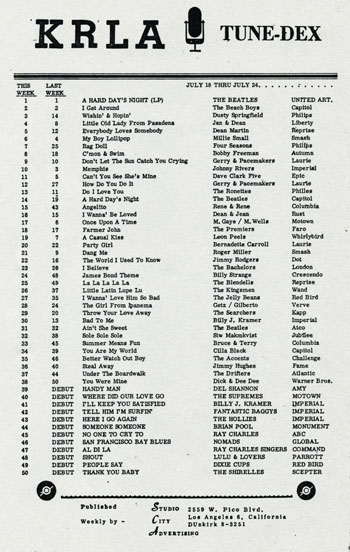
For the second week the record album "A Hard Day's Night" was still at the top of the Tunedex, KRLA's singles chart.
As an "earwitness" to the situation at the time, I can confirm that KRLA was playing the complete LP in bits and pieces (sorry for the Dave Clark Five reference there), usually two or three tracks per hour. Because this was the official soundtrack, we also got to hear the instrumentals from the film, scored by Beatles producer George Martin.
Playing entire albums on the radio just wasn't done in those days, so KRLA was breaking precedent, to their advantage as well as ours.
The British version of the LP was different in configuration and wouldn't be distributed in America for several decades. But I wouldn't be surprised if KRLA deejays had procured a copy of the English version somehow and were playing tracks from it.
I clearly remember the song "I'll Be Back" being played in rotation in Summer 1964. For most Stateside listeners the song wouldn't be available for airplay until the release of "Beatles '65" some five months later.
There were three British powerhouse singers on this week's Tunedex too, all women entertainers of special note. Dusty Springfield's "Wishin' and Hopin'" had climbed to number three this week, while the only female singer in Brian Epstein's employ was "swinging" Cilla Black. Her rendition of "You're My World," also produced by George Martin, was at number 34.
And at number 48 was the debut single of fifteen-year-old Lulu, backed by her group The Luvvers, with a spine-tingling cover of The Isley Brothers' "Shout."
What a swinging summer it was!
As always, click the image above to enlarge this week's Tunedex.
KRLA Tunedex, July 25-31, 1964
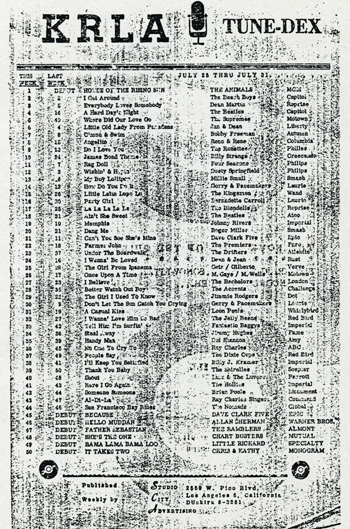
Another first for the British Invasion. But wait...The Animals debut at number one? Where'd they come from?
This was the first appearance on the American charts of a group from Newcastle Upon Tyne on the other northern coast of England. It was originally keyboardist Alan Price's group, formed in 1961 and called The Alan Price Rhythm and Blues Combo. Singer Eric Burdon joined the group in 1962 and the band began to pull in two opposite directions. Price preferred jazzy overtones, but Burdon was all rhythm and blues. Their raucous style on stage, it's been said, led to the band's name change, and The Animals were born.
While gaining some musical traction in London in 1963 they teamed up with producer Mickie Most. Their first single, "Baby Let Me Take You Home," earned them a few appearances on the British TV show "Ready, Steady, Go!" But it was their second single that made them a musical force on the airwaves.
"House of the Rising Sun" had a complicated pedigree reaching back into the eighteenth century. In the twentieth century it was sung by a passel of folk and blues singers, including "Tom" Clarence Ashley and Gwen Foster, Roy Acuff, Woody Guthrie, Josh White, Leadbelly, Glenn Yarborough, The Weavers, Pete Seeger, Frankie Lane, Joan Baez, Bob Dylan, and Dave Van Ronk. You'd think it might have worn out its welcome, but The Animals made it their own.
No question it was Alan Price's swirling, hypnotic keyboards that mesmerized listeners fifty years ago. But it was also powerfully, irresistibly sung by Eric Burdon in his best bluesy delivery, and lead guitarist Hilton Valentine performed a masterful opening arpeggio on his beautiful Gretsch Tennessean.
Burdon claimed that he first heard the song performed by Northumbrian folk singer Johnny Handle and suggested that The Animals perform it while on tour with Chuck Berry in May 1964 to make them sound distinct from Chuck Berry's straight-ahead rock-and-roll. The group recorded the tune in London that same month---and in one take. As Burdon later told Rolling Stone Magazine,"We were looking for a song that would grab people's attention." It seems to have done its work.
If you heard it on KRLA at the time, you probably heard it in two versions. One clocked in at over four minutes, a "record" length for any British or American single. KRLA played the full version as well as an edited one that unfortunately shortened Price's keyboard solo. But what's a radio station to do? There were only so many minutes in an hour to devote to music...and commercials paid the bills.
KRLA Tunedex, August 1-7, 1964
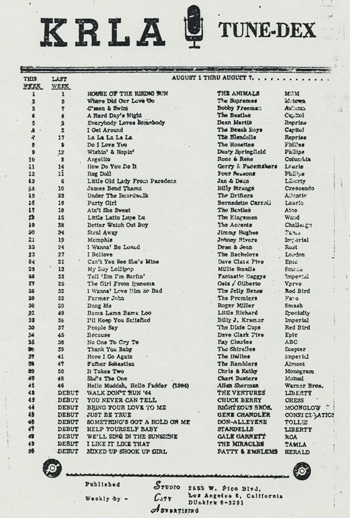
The Animals enjoy week two with their number-one hit still at the top of the Tunedex. KRLA, as usual, was ahead of the game. It would be a week before the national charts began to reflect the group's ascendancy. "House of the Rising Sun" wouldn't enter Billboard's Hot 100 chart until the following week.
The Supremes were nearing that same exalted spot this week fifty years ago with their Motown single "Where Did Our Love Go?" at number two, beating out the Beatles themselves, whose single of "A Hard Day's Night" was safely ensconced in the number four position.
The Tunedex was compiled differently from national charts, so anytime you compare the two you're bound to see differences. On Billboard's Hot 100 this week "A Hard Day's Night" was at number one, followed by The Four Seasons with "Rag Doll" and Jan & Dean's' "The Little Old Lady (From Pasadena)." Billboard was using sales factors alone whereas KRLA was using a mix of sales, call-in requests, and deejay suggestions for its Tunedex.
For a change, someone else was having license renewal problems this week. KRLA's permanent license had yet to be decided, but this week, reported Billboard, KRLA rival KFWB was under scrutiny by the FCC for claims of payola, "poor programming practices" whatever those were, "questionable" broadcast material, and suspiciously-run promotions.
At least KFWB received a one-year extension of its own license, while Oak Knoll Broadcasting continued to run KRLA as essentially a non-profit enterprise, with the station's eventual sale to one of nineteen different bidders a real possibility...maybe to someone not so invested in rock-and-roll. The horror!
Meanwhile, in the department of extreme irony, the group that British label Decca Records chose to sign rather than the Beatles were making their first inroads into the American music business. Brian Poole & The Tremeloes had their first single "Someone, Someone" released on Monument Records, where it went exactly nowhere. After jettisoning Poole a few years later The Tremeloes would be heard from again, quite respectably so.
And American Decca decided to jump on the Beatles bandwagon and nominate Ringo for president -- it was an election year, after all. Their novelty tune, sung by the Young World Singers, also didn't make any waves on the charts. What goes around....
To enlarge this week's Tunedex, click the image above left and all will be revealed.
KRLA Tunedex, August 8-14, 1964
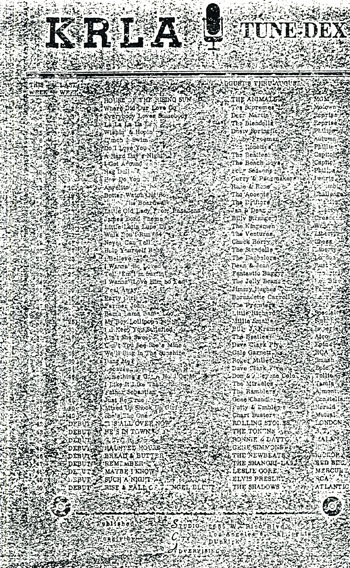
I know, I know...the scan of this week's Tunedex is almost unreadable due to its original background color. Just go right over to Oldiesloon's site for a clean transcription of the chart listing. In the world of Tunedex archaeology we can only do what we can with the materials we unearth.
The Animals retain their number one spot for the third week, with the Supremes in number two, also like last week. At number three is Dean Martin's "Everybody Loves Somebody," a middle-of-the-road interloper on what was mostly a rock-and-roll chart listing.
One unusual entry is at number twenty is "Help Yourself Baby" by none other than the Standells, in a remarkable leap up from number forty-seven just the week before. In late 1965 the group would record their most popular hit, "Dirty Water," but this week fifty-nine years ago this Southern California band was finding itself and its sound. They'd been label-hopping in an effort to get some traction somewhere -- maybe the leap to Liberty records was doing the trick for them at last.
Just on the horizon was a very exciting event: The Beatles' first extensive U.S. tour, set to begin at the Cow Palace in San Francisco on February 18. Bill Black's Combo, Jackie DeShannon, The Righteous Brothers, and The Exciters were set to accompany them. For KRLA it was a heady time. Deejay Bob Eubanks had borrowed $25,000 on a house he co-owned with investment partner Mickey Brown (not on Bob's own residence, as popular legend has it) to book the Fabs at the Hollywood Bowl on August 23. The Los Angeles airwaves were full of all things Beatle-related this month but KRLA had the biggest coup of all. It's no exaggeration to say that the concert would lead to a very unexpected publishing opportunity for the radio station...as you can probably guess.
Click the image above left to open a PDF of this week's Tunedex...if you dare.
KRLA Tunedex, August 15-21, 1964
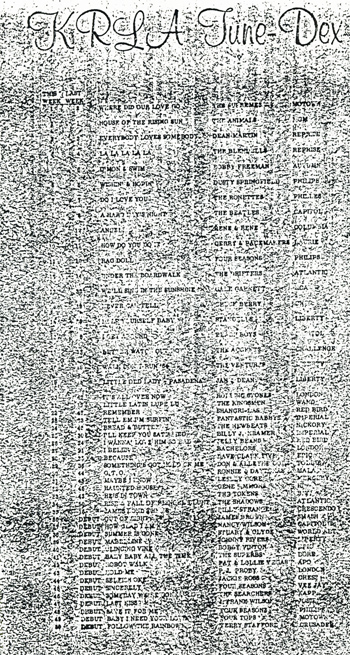
Bad quality Tunedex again this week, sorry to report. We're at the mercy of those who came before us and ineptly photocopied the charts. The only thing we can note on the original this week: somebody got creative with press type! The logo, instead of the solidly comforting serif font and the little microphone icon, is now flowingly elaborate script. To read this week's Tunedex clearly we recommend Oldiesloon's transcription.
Just a week before the Beatles' appearance at the Hollywood Bowl, guess who's at the top of the Tunedex? Not the Fabs...but rather The Supremes. They'd been a group for four years at this point and "Where Did Our Love Go?" was deservedly number one.
There's plenty of British presence in the Tunedex: the Beatles have "A Hard Day's Night" at number eight, puzzlingly, because Billboard placed it at number one nationally. "The Animals' "House of the Rising Sun" is still at number two, The Rolling Stones are climbing high with "It's All Over Now" at number twenty, up from number forty-two. We also have tunes from Billy J, Kramer, Chad & Jeremy, and The Searchers.
Fourteen songs make their debut this week, one of which was by a Texan artist, P.J. Proby, whose career was championed by songwriter Sharon Sheeley. Fame in the United States eluded him mostly, and he was much more popular in the British charts.
Mistyped, the song at number forty-three this week was actually "Hold Me." Proby received a lot of coverage in the early days of the KRLA Beat, probably because of his perceived British image rather than his American persona. And there was that pants-splitting incident in early 1965 in Croydon, Surrey...but I'm sure that was entirely an accident.
Click the image above left to open a PDF of this week's Tunedex, and again, sorry about the quality.
KRLA Tunedex, August 22-28, 1964
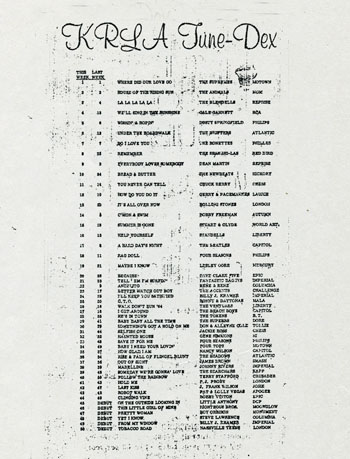
One of KRLA's strengths during 1964 -- besides going all-out as the official Beatles station of Los Angeles -- was its varied playlist. Over the summer we've seen that there isn't a lot of rapid change in record placement. But what's notable is the quantity and variety of music on KRLA's chart.
The big hitters from all over the world are still in the Tunedex, but so are a number of regional and local artists, folks not on the bigger labels but with their own unique sounds. The Fantastic Baggys were actually Los Angeles songwriters P.F. Sloan and Steve Barri, whose "Tell 'Em I'm Surfin'" had remarkable staying power during the summer of 1964.
The Standells couldn't get a major recording contract in 1964, but on KRLA their single "Help Yourself" got significant airplay. And Pat and Lolly Vegas, surf music aficionados from Coalinga, California, charted with their tune "Robot Walk." The duo would later write songs such as "Niki Hoeky" for P.J. Proby (his only hit), and the Vegas brothers evolved into the group Redbone in the 1970s.
Even non-local records could find a home at KRLA, like Texans J. Frank Wilson & the Cavaliers' "Last Kiss," and St. Louis' Jackie Ross, a protege of Sam Cooke, at number thirty-one this week with "Selfish One."
Rival station KFWB was terrified. According to Billboard Magazine the Hooper surveys, which rated local listenership, placed KRLA well ahead of KFWB. What did KFWB do? Program director Jim Hawthorne (who had actually been a deejay at KXLA in the late 1940s and early 1950s) decided to reformat their playlist to do the opposite of what was making KRLA such a success.
Hawthorne cut back on local artists, halved the playlist (KRLA was playing 55-75 records in rotation a day), and focused on national rather than regional hits. It perplexed and exasperated record industry men, moving one harassed promotion director to tell Billboard that as a result of cutting KFWB's playlist in half "Everybody's going out to KRLA!"
Asked about KRLA's success, station manager John Barrett said that he actually encouraged his deejay-program directors Dick Moreland and Reb Foster to visit local record shops to see what was selling, and thus compile KRLA's playlist from those statistics. And there you have a recipe for radio success.
There was that little thing about the Beatles too. On August 23, 1964 KRLA became the only local radio station to host the Beatles at the Hollywood Bowl. All KFWB could do was watch their market share continue to shrink as KRLA's continued to grow...and grow!
Click the image above left to open a PDF of this week's Tunedex, which is readable again, and for which we are grateful.
KRLA Tunedex, August 29-September 4, 1964
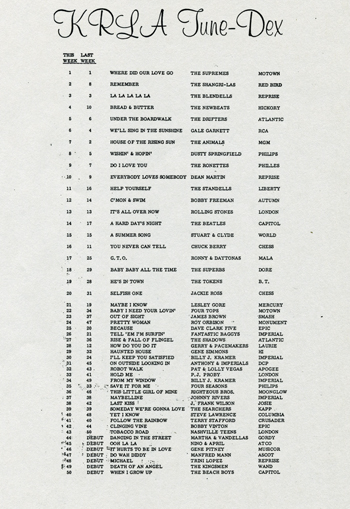
Just to demonstrate KRLA's determination to do right by the still-thriving British Invasion, now in its ninth month, charting at number 27 (up from number 36) is a curious song by the Beatles' old nemesis, The Shadows.
"The Rise and Fall of Flingel Bunt" was a number five hit in the UK at the time, and this quintessential British instrumental group was showing that it could still manage hits without its lead singer. Cliff Richard had elected to go solo several years earlier and had devolved into mindless musical treacle---which still sold in England to those who preferred their pop idols to be safe and sane.
But The Shadows, known on British TV for their choreographed dance moves and precision guitar work, were holding their own on the KRLA Tunedex this week right next to the younger generation of invaders: The Animals, The Searchers, The Beatles, The Rolling Stones, Dusty Springfield, Chad & Jeremy and The Nashville Teens (who weren't from Nashville).
It's likely that The Shadows wouldn't have made any inroads into the U.S. without the help of the British Invasion and KRLA's perspicacious program directors, but ironically that didn't help Cliff Richard. Huge in England in his day, he was never popular in America and his retro crooning was out of step with what record buyers wanted.
George Harrison in "The Beatles Anthology" shared the group's view that The Shadows' safe, formulaic approach to rock and roll was not for them, and in a slight dig at the group, George titled his first solo musical composition "Cry For A Shadow." But here the both wonderfully were, sharing space on the Tunedex.
Another friend from the Beatles' past was Roy Orbison, always a steady presence on both the American and British charts. They'd toured as a supporting act with Roy in England from May to June 1963 and they were stunned at Orbison's stage magnetism. This week Roy's big single, "Oh Pretty Woman," was on the rise, clocking in at number 24 this week fifty years ago, up from its debut at number 47 last week. The single would go to number one in the American and British charts.
Click the image above to open a PDF of this week's Tunedex.
KRLA Tunedex, September 5-11, 1964
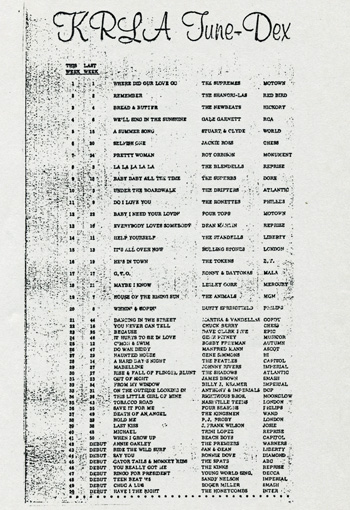
In early September 1964 the political universe was heating up with the U.S. presidential election just around the corner. Several political satire records stirred up controversy on the east coast, where an LP called "I'd Rather Be Far Right," lampooning Republican presidential candidate Barry Goldwater, was banned outright by WNEW.
This triggered Greenleaf Records, a struggling minor label, to release its own response records, "Ballads to Bug Liberals" and "I'm No Communist"...none of which gained any traction on the KRLA Tunedex.
We did have the debut of "Ringo For President" at number 47 this week by the Young World Singers, who sound remarkably like The Carefrees, whose release "We Love You Beatles" charted on the Tunedex earlier in 1964. But that was the extent of political controversy in 1964 on KRLA.
In fact, KRLA became the inventor of a new deejay marketing campaign...or rather morning man Bob Hudson did. Morphing from "Beautiful Bob" he became "Emperor Bob" Hudson. Gil Faggen in the September 12, 1964 issue of Billboard sounded the alarm: "Democracy is lost! The Presidency is in jeopardy! The nation gears for the rise to power of regional Emperors!"
The appearance on KRLA of Emperor Bob, complete with KRLA's home-generated promos and skits, was noticed by radio pundits, particularly by the Mark Century Corporation of New York, syndicators of radio promotions nationwide. They leased Emperor Bob's entire royal regalia and sold it to stations around the country.
In Syracuse at WNDR it was Emperor Art Wander. In Minneapolis at KDWB it was Emperor Charlie Brown. Billboard noted that "the Emperor bit allows a local deejay to be as pompous and arrogant as he likes and get away with it." That's one way to feed an ego.
This week fifty-nine years ago it was the usual mix of music from the U.K. as well as the U.S., with two new British Invasion folks breaking into the charts. The Honeycombs debuted at number 50 with their Joe Meek production "Have I The Right," and a foursome that was to have considerable staying power throughout the 1960s and 1970s burst onto the scene at number 46: The Kinks with "You Really Got Me."
For several weeks the KRLA Tunedex has sported this minimalist look, lacking a printed date as well as the footer where the Tunedex address had been and sporting its anomalous cursive headline. Was it being typed in-house by a station secretary instead of by Studio City Advertising, its previous publisher? Was KRLA saving money due to the expense of their recent Beatles Hollywood Bowl concert? Hard to know...but something's afoot!
Click the image above to open a PDF of this week's Tunedex.
KRLA Tunedex, September 12-18, 1964
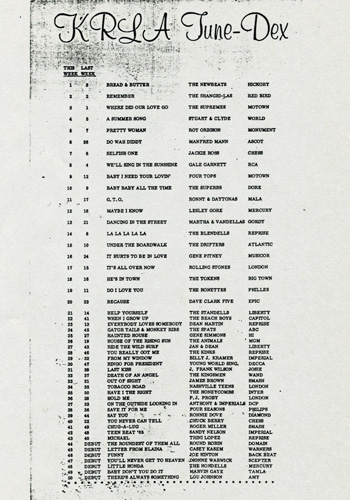
I'll bet The Newbeats were surprised. Here they are at the top of the Tunedex.
Dean and Marc Mathis were teenagers in Georgia playing in a western swing band, and with a few early record releases they tried their best to imitate the Everly Brothers. Along came Texas songwriter Larry Henley with his distinctive falsetto, joining the duo to become The Newbeats.
"Bread and Butter" was their first and very nearly only hit, rocketing to number one at KRLA and number two on the national charts. It was a quirky, singsong little tune that somehow found its mark during that hot, long-ago September.
Rounding out the top five are two iconic girl groups, The Shangri-las with "Remember (Walking in the Sand)" and The Supremes with "Where Did Our Love Go?" plus Chad & Jeremy's sweet "A Summer Song" and Roy Orbison with "Pretty Woman."
And unless my eyes deceive me, no trace of the Beatles on the Tunedex this week.
Oh, wait. There's Casey Kasem's "Letter from Elaina" debuting at number 45. I guess that counts.
Twelve year old Elaina Tribble wrote a fan letter to Kasem after seeing the Beatles perform at the Cow Palace in San Francisco on August 19, 1964. He read it on the air during his afternoon show and KRLA's phone line lit up with requests to hear it again. So Kasem recorded a reading of it with an instrumental version of "And I Love Her" playing plainively in the background. Hear how Elaina hugged George here.
Click the image above left to open a PDF of this week's Tunedex.
KRLA Tunedex, September 19-25, 1964
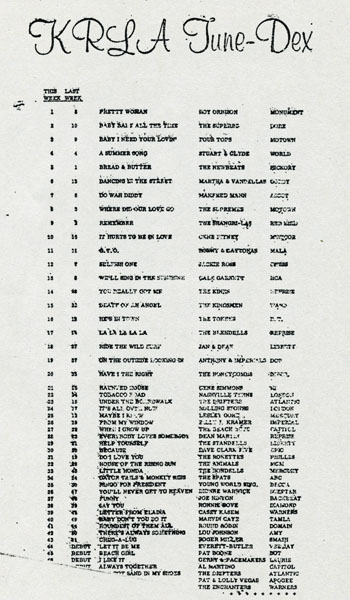
Roy Orbison needs no introduction. He was a mainstay of the first wave of rockabilly/rock-and-roll with consistent chartbusters spanning the late 1950s through the early 1960s. His wide vocal range was stunning to behold.
During the first year of the British Invasion he might have seemed out of context, but "Pretty Woman" was just the tune to carry him back to number one. And he'd be there for a few more weeks, well into October.
And it worried no one at the time that the Beatles hadn't had a hit single on the Tunedex. They were between releases, with their next album "Beatles For Sale" (much of which was released in the U.S. as "Beatles '65") scheduled for its December debut.
This week fifty-nine years ago on the Billboard album charts, two of the Fabs' albums were happily ensconced in the number one and two positions. The United Artists soundtrack "A Hard Days Night" took top honors this week, while number two was their Capitol release "Something New."
The rest of this week's Tunedex shows a healthy mix of British and American artists, as well as one more crooner from yesteryear, Pat Boone, debuting his "Beach Girl" on Dot Records at number 45. The surf craze was pretty much over at this point in the game, although Jan & Dean were still kicking up the salt spray with "Ride the Wild Surf" at number 18.
Click the image above to open a PDF of this week's Tunedex. A corner is damaged and the copy isn't pristine so you might want to check out the fully transcribed list of this week's Tunedex at Oldiesloon's website.
KRLA Tunedex, September 26-Oct 2, 1964
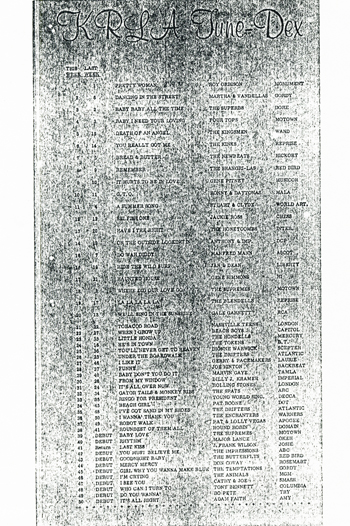
A single with tremendous staying power reached its popularity peak this week in the Tunedex: The Kingsmen's totally forgotten "Death of an Angel" at number five, up from fifteen. Somebody at KRLA clearly loved the song. It's highest point nationally was at number 42.
Curiously, "Death of an Angel" wasn't an original but was rather a cover of a 1955 release by Donald Woods and the Vel-Aires. The Kingmen gave the tune a much-needed tempo boost and a peppy organ accompaniment, but if you listen to it today it's pretty easy to figure out why "Louie Louie" is the song everyone remembers when you mention their name.
The rest of the Tunedex is decidedly less lugubrious this week fifty years ago. The energy was palpable: Roy Orbison's "Pretty Woman" still at number one, Martha and the Vandellas' irresistible "Dancing in the Street" at number two, The Four Tops' swinging "Baby I Need Your Loving" at number four, and The Kinks' perfect wave of passion in "You've Really Got Me" at number six.
Along with the debut this week of one of the The Supremes' biggest hits, "Baby Love," at number 39, two of my favorite British Invasion releases enter the Tunedex this week: The Animals' "I'm Crying" at number 46, and Adam Faith's raucous and rousing "It's Alright" at number 50.
Adam Faith was a member of the pre-Beatles British contingent of crooners from the late 1950s and early 1960s, and in fact earned Parlophone Records (who later famously recorded some group from Liverpool) the label's first number-one hit in 1959, "What Do You Want?" Faith's vocal style paid tribute to Buddy Holly with his characteristic hiccupy delivery, and the song was co-produced by John Barry, who would later gain acclaim as a composer of film scores.
With "It's Alright," Faith accomplished what his compatriots, including Cliff Richard and Billy Fury, failed to do. He had a top-40 record in the American charts. Of course he was riding the coattails of the British Invasion...but whatever works.
Click the image above to open a PDF of this week's Tunedex. Dodgy quality this week, sorry about this, but Oldiesloon's website has a transcribed copy.
KRLA Tunedex, Oct 3-9, 1964
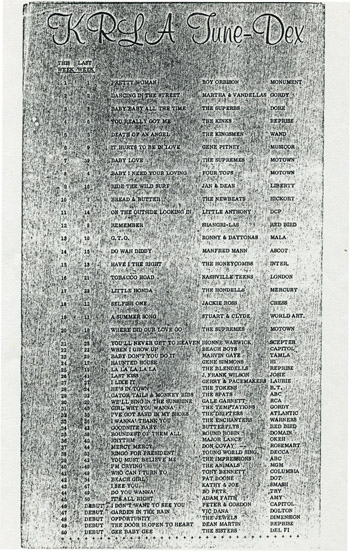
Roy Orbison with "Pretty Woman" is still at number one for the week of October 3-9, 1964, but a contender is racing up the charts. The Supremes are on fire with "Baby Love," rocketing up from number 39 last week to number 7 this week.
The Detroit sound wasn't doing too badly on the charts either. With three related labels, Tamla, Motown, and Gordy, hit after hit was making waves in the KRLA Tunedex.
Martha and the Vandellas had "Dancing in the Streets" at number two. "Baby Love" (of course on Motown) and The Four Tops' "Baby I Need Your Loving" (also on Motown) were at number seven and eight, while an earlier Supremes' tune "Where Did Our Love Go?" on Motown was down to number 20. Marvin Gaye, on Tamla, was climbing with his release "Baby Don't You Do It," settling in nicely at number 23.
Not to be outdone, in this week's Billboard Capitol Records declared it "The Year of the Beatles" as their sales hit an all-time peak. In the fiscal year ending in June 1964 Capitol record revenue hit $57,460,133, almost nine million dollars over the previous fiscal year. When you think about it, that means a half year of Beatles releases (only from January to June) was mostly responsible for Capitol's increase. Not bad for a label that told its parent company, British EMI, that they knew nothing about the music Americans wanted to hear.
Tell that to United Artists! Fifty years ago this week that perspicacious label, having snapped up the distribution rights to The Beatles' "A Hard Day's Night" soundtrack, presented the Fabs with four identical gold albums to represent 1,000,000 in sales since July 1964. And sales were shortly expected to hit 2,000,000 for the year.
Meanwhile, back at KRLA, something was afoot in the print department. We're about to hit another fifty-ninth anniversary of...well, here's a hint: it's black and white and read all over.
Click the image above to open a PDF of this week's Tunedex.
KRLA Tunedex, Oct 10-16, 1964
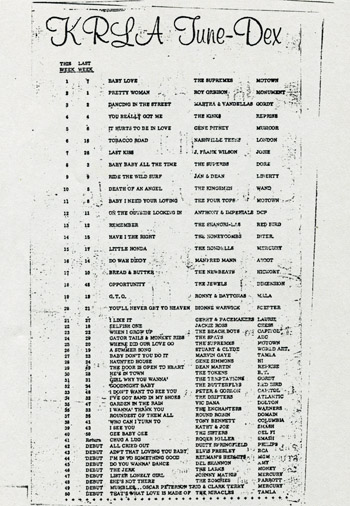
At London's Variety Club, where the 1964 Melody Maker Pop Poll awards were handed out, one outspoken fellow let his opinions run wild and free. Elkan Allan, head of light entertainment at London's commercial TV group Rediffusion, complained loudly that "there was too much beat music on the air." Artists like Barbara Streisand, Nat King Cole, and Peggy Lee couldn't get proper airplay because the public kept clamoring for rock-and-roll. "It's time we did something about it!" he fumed.
American music industry folks had a different opinion entirely. Publicly, at least, there were no more complaints about the predominant British Invasion. Quite the contrary. New English artists were turning up all the time---look at this week's KRLA Tunedex for a start.
Two new British acts have debut singles in the Tunedex: Herman's Hermits cover of Earl-Jean's hit "I'm Into Something Good" at number 44, and The Zombies at number 48 with their first American single "She's Not There."
In fact the Tunedex was peppered with Brits fifty-nine years ago this week: The Kinks, Peter & Gordon, Chad & Jeremy, Gerry & the Pacemakers, Manfred Mann---and there was plenty of representation from established American acts like Jan & Dean, The Beach Boys, Roy Orbison, the Supremes, Gene Pitney, Anthony & The Imperials, and others too numerous to mention. Look at the Tunedex to sample the variety.
Somehow, despite beat and rock music, there was even room for mainstream artists like Dean Martin, Vic Dana, Tony Bennett, Johnny Mathis, and a true rarity on the pop charts, a jazz group. The Oscar Peterson Trio with Clark Terry debuted at number 49 with their single "Mumbles" on Mercury Records.
Maybe domestic record executives had seen the light at last. No fools they, it was clear that American music charts were thriving with sales up all around, even for minor labels that happened to snag a new British act---Vee Jay, for instance, had enjoyed a nice run in 1963 and 1964 with their multiple recombinations of the Beatles tracks that they were licensed to distribute. Sit back, relax, and listen! The more sounds on the radio, the better for all.
Click the image above to open a PDF of this week's Tunedex.
KRLA Tunedex, Oct 17-24, 1964
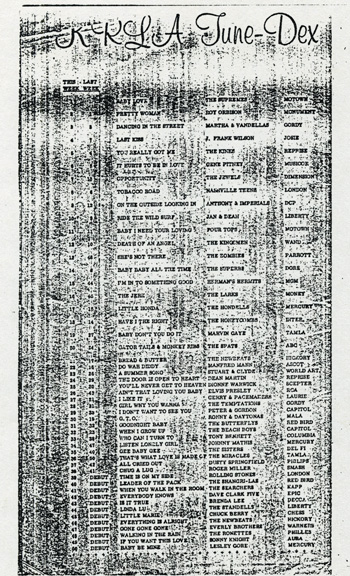
Two British releases are rocketing up the Tunedex this week: The Zombies' first American hit "She's Not There" (with its unintended but dominant heavy breathing by lead vocalist Colin Blunstone---mono version only) at number 12, up from its debut at number 48, and Herman's Hermits with "I'm Into Something Good" at number 15, up from number 44.
Two other British groups make a showing with their debuts on the Tunedex this week. The Rolling Stones appear with "Time Is On My Side" at number 39, while The Searchers offer "When You Walk In The Room" at number 41, a nice cover of Jackie DeShannon's hit.
The Supremes, Roy Orbison, and Martha and the Vandellas share the status quo with their number one, two, and three hit records still firmly ensconced at the top of the charts.
There was a touch of gloominess to the Tunedex this week with the number four record by J. Frank Wilson and the Cavaliers, "Last Kiss." One of those distinctive teen laments about death by car crash, "Last Kiss" had remarkable staying power that autumn season.
Debuting at number 40 this week was a new take on teen death songs, "Leader of the Pack" by the Queens, NY female foursome The Shangri-Las. This time, instead of a car crash being the focal point of its lyrical angst, it was a motorcycle crash, complete with leather-clad boyfriend vanishing into the sounds of tire squeals and metal hitting asphalt. The Shangri-Las' success put them in a perfect place to accompany the Rolling Stones on their Fall 1964 tour of the U.S....which the KRLA Beat covered in their earliest issues.
Click the image above to open a PDF of this week's Tunedex.
KRLA Tunedex, Oct 25-31, 1964
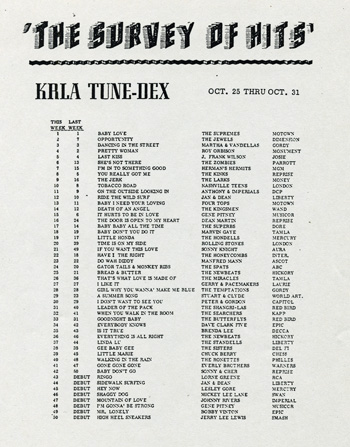
Hooray, we have a redesign of the Tunedex this week! And for a change it's being printed on light-colored paper so it scans and copies better than before. Certain details point to it being produced in-house too, like the press-type rub-on typography in the headlines and the squiggly border.
You see the same design components in the fledgling KRLA Beat newsletter that was in production during this period, so it's likely that the same staff was working on both.
It was quite the week for songs with the word "baby" in the title somewhere---"Baby Love," "Baby I Need Your Loving," "Baby Baby All The Time," "Baby Don't You Do It," "Goodnight Baby," "Gee Baby Gee," plus "Baby Don't Go," the first soon-to-be-hit by Sonny & Cher. There's also the debut of a song at number 43 by TV actor Lorne Greene that had nothing to do with the Beatles, "Ringo," a tune about an outlaw cowboy with a heart of gold.
The Jewels were a determined groups of young women from Washington DC who had begun singing as The Impalas. Never having had much luck in the hit department, they were probably surprised to see their bluesy single "Opportunity" climbing so far up the KRLA charts, where they clock in at number two this week. Nationally "Opportunity" reached only number 64. But on KRLA The Jewels enjoyed the big time for just a little while.
Click the image above to open a delightfully readable PDF of this week's Tunedex.
KRLA Tunedex, Nov. 1-7, 1964
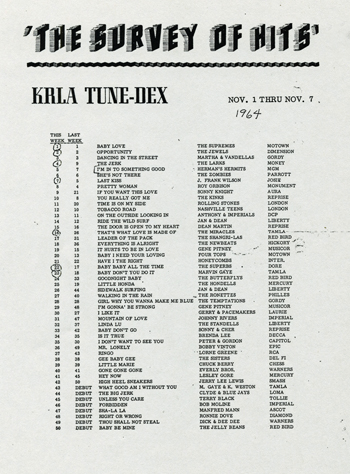
While there's not much change in positioning this week on the Tunedex, there are a few tunes jumping up up the chart. Witness The Rolling Stones with "Time Is On My Side" at number 11, up from number 20 the previous week. An envious British friend mentioned that this single was never released in the UK, but in the U.S. it made an impression on local radio, especially on KRLA. Not coincidentally, KRLA deejay Bob Eubanks had booked the Stones plus a host of other acts, British as well as American, into the Long Beach Civic Auditorium for a November 1, 1964 concert.
Also in town this week was Brian Epstein, squiring his two groups, Gerry & The Pacemakers (whose single "I Like It" was still at number 30 on this week's Tunedex) and Billy J. Kramer & The Dakotas. Both groups were here for the Long Beach concert as well as appearances on what the music industry press referred to as the "Electrovision" or "Electronovision" show, now known as the T.A.M.I. Show. And there was an appearance on TV's "Shindig!" as well, hosted by ex-KRLA deejay Jimmy O'Neill, about whom the KRLA Beat would say nothing. No reason to hype the competition!
J. Frank Wilson & The Cavaliers were still in the top ten this week when their song "Last Kiss" turned uncomfortably prophetic. Sonley Roush, manager of the group, was killed in a car crash on October 23, 1964 after falling asleep at the wheel. Wilson and three other members of the Cavaliers were seriously injured in the accident. While "Last Kiss" was still at number seven on the Tunedex, it was at number three on Billboard's Hot 100 chart that same week.
Click the image to open a PDF of this week's Tunedex.
KRLA Tunedex, Nov. 8-14, 1964
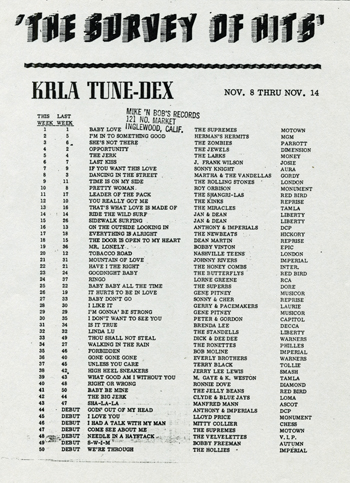
It's hard to imagine now, even with this latter-day vinyl revival, that there could be hundreds of record stores to choose from in any given metropolitan era.
Even in smaller towns you'd likely have your pick of small music shops, department stores, sheet music stores, and even appliance stores to pick up your single of choice. Singles were still the dominant music format fifty-nine years ago, and teenagers had money to buy whatever they fancied.
Tapping into that market was good business for local record stores. Providing freebies was another plus. Hence printed items like KRLA's Tunedex, which were given out with or without purchases to keep the customers coming back for their weekly "fix." To an extent the earlier newsletter-style editions of the KRLA Beat were building on this interest, providing more news about the groups and singers behind the weekly chart hits.
This week's Tunedex comes courtesy of Mike 'n Bob's Records in Inglewood, California, then a sleepy suburb just southwest of the city proper. We see that the usual folks are still in control of the top ten, with the Supremes sharing the spotlight with newcomers Herman's Hermits, whose "I'm Into Something Good" was at number two this week, plus The Zombies' "She's Not There" at number three. There was still a lot of good listening on the airwaves this week.
Click the image above to open a PDF of this week's Tunedex.
KRLA Tunedex, Nov. 15-21, 1964
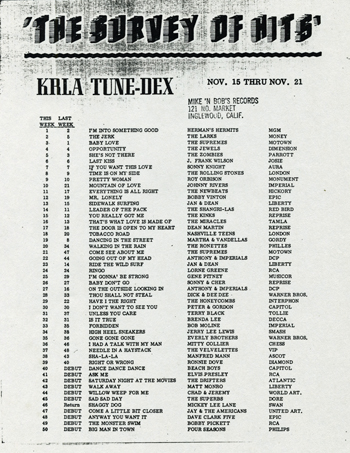
This is why we listened to KRLA.
Okay, it's one of the reasons. But it was a big one. KRLA's efforts to become the number-one rock-and-roll station in the Southland required Herculean efforts to out-perform its biggest rival, KFWB. And getting its virtual mitts on an exclusive Beatles record was undeniably a hand well played.
While this week's Tunedex shows all the officially-aired records in rotation, including the worthy Herman's Hermits with "I'm Into Something Good," even the debut section of the Tunedex didn't reveal the special songs that KRLA was premiering...like the Beatles' newest single, "I Feel Fine/She's A Woman."
Capitol Records, predictably, was having a hissy fit. The record was officially scheduled for release on November 23, 1964, but KRLA had obtained a copy on November 6 and had been playing it in regular rotation ever since. "This advance play creates a false demand," huffed a Capitol executive. What was false about it? It was legitimate and real, right now fifty-nine years ago, and KRLA program director Reb Foster pointed out that it was KRLA's business to break records...just as stations had done in December 1963 when listener demands trumped "I Want To Hold Your Hand"'s official release date.
As much as the Tundexes tell us about song ratings, there was a tremendous amount of music being played that was never publicly documented. If we had the original KRLA station logs...now that would be something! But without them all we can rely on is memory.
Memory tells us that KRLA was playing Beatles and Stones album tracks, the better to stir interest in groups that listeners craved. This was a phenomenon noted by Billboard contributing editor Bill Gavin in the November 21, 1964 issue of the magazine, where he recommended that stations consider playing album tracks of artists like The Beatles, Roy Orbison, The Beach Boys, and The Supremes.
Of course KRLA was already ahead of the game. Even obscure records made it onto KRLA's airwaves, though they may never have charted, like Travis Wammack's "Scratchy," a hypnotic, syncopated guitar homage to Mel Tormé's "I'm Comin' Home." It also includes what may be the first pop-music use of backwards lyrics (if you want to call them lyrics)...two years before the Beatles themselves employed the trick. About this time "Scratchy" was barely denting the door at number 95 Billboard's Hot 100, but KRLA was looking for obscure tracks to supplement the popular ones.
Reb Foster was right. And we were lucky to have our devious deejays looking out for KRLA's best interests. The music was more various as a result, and our memories richer too.
Click the Tunedex image above to open a PDF and read it in detail.
KRLA Tunedex, Nov. 22-28, 1964
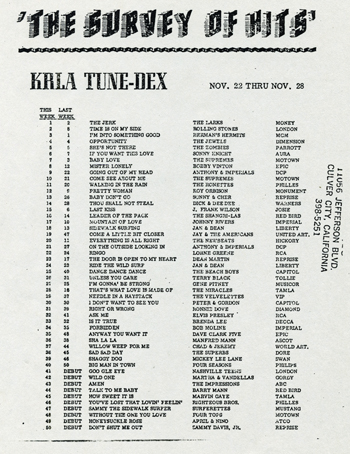
For the second week in a row at number one is the soft and gentle "The Jerk" by Don Julian and the Larks. Julian, a Texas native who came to Los Angeles in his teens, had been a presence in Southland doo-wop and R&B for over a decade, originally with different personnel in a band then called The Meadowlarks.
With The Larks he enjoyed his only number-one hit, though he remained a force in R&B and funk throughout the rest of his career, which ended prematurely at the age of 61 in 1998.
Lest you think that holiday creep is a purely modern phenomenon, you need only look at music industry publications of the time to find out the truth. There's no hint of it in this week's Tunedex, but galloping at full speed it was all over the place.
Billboard's November 28, 1964 issue had already started hyping Christmas sales plans, with ads for everyone from Doris Day to Burl Ives showcasing their holiday spirit. Capitol Records' Dave Dexter said that record fans would soon have two new Beatles albums for stateside fans, including an assembly of interviews and musical tidbits called "The Beatles Story," plus a new LP called "Beatles '65." Unbeknownst to Beatles fans this was a partly prepackaged version of the British release "Beatles For Sale," with fewer included songs than the Parlophone release. All the better to squeeze extra albums out of the material and charge American listeners for the privilege.
Buried in the radio news section was the notice that KRLA's top rival, KFWB, was changing its program director come the new year in 1965. Jim Hawthorne (himself a deejay at the land of 1110 when it was country-western KXLA in the late nineteen-forties) was out, and Don French from KDWB in Minneapolis was in. Was there a reason, one has to wonder?
Well, the fact that KRLA had been delivering all the big concerts in the Los Angeles region, from the Beatles on down, might have been one reason. Then there were all those fans were starting to listen to the station that scooped everyone else by playing the Beatles' "I Feel Fine" before KFWB. No doubt the friendly banter in the KRLA Beat, now being distributed all over the Southland, had some influence too.
The New Year Hooper reports on Los Angeles radio listening would make it all clear. KRLA was, for the first time, starting to outrank number one KFWB, which scrambled to recapture those lost ratings with a new PD. Alas for KFWB, its best days were in the past. For KRLA there was an open road and no speed limit...a nice place for KRLA to find itself fifty-nine years ago.
Click the Tunedex image above to open a PDF and read it in detail.
KRLA Tunedex, Nov. 29-Dec 5, 1964
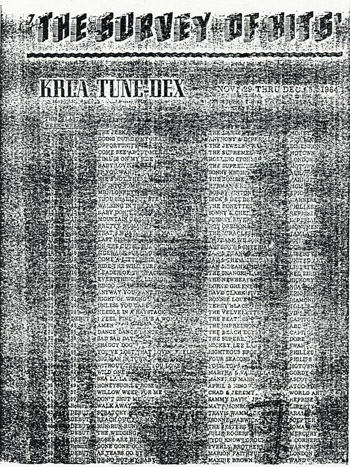
Alas, they're back to colored paper stock in this week's Tunedex. We've lighted it as best we could but if it's all too much try the transcription at Oldiesloon's website.
A notable debut this week, at number 29, was The Beatles latest single after some weeks of no Beatles on the singles chart: "I Feel Fine/She's A Woman." Technically KRLA had been playing a copy of the song since early November, but as a courtesy to Capitol Records, who didn't release the single officially until November 25, KRLA kept it out of the Tunedex until it was available for sale.
What would become The Righteous Brothers' biggest hit, "You've Lost That Lovin' Feeling," had debuted at number 46 the previous week, but now it was climbing fast at number 34. Written by Phil Spector, Cynthia Weil, and Barry Mann, it was produced by Spector using his classic "wall of sound" technique, and it included then-almost-unknown Cher as a backup singer. The tune would go on to become a number-one hit in both the U.S. and the UK.
At number 49 this week fifty-nine years ago was the debut record by singer Marianne Faithfull, whose record, "As Tears Go By," was written by Mick Jagger, Keith Richards, and Rolling Stones manager Andrew Loog Oldham. Quite a musical pedigree!
Click the Tunedex image above to open a PDF and read it in detail.
KRLA Tunedex, Dec 6-12, 1964
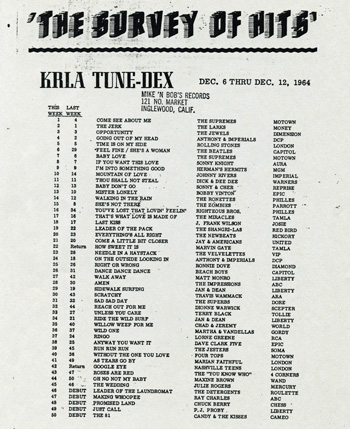
If KRLA had anything to thank its lucky stars for this month fifty years ago, it probably involved being passed over for an investigation by the FCC. License troubles were till in the mix, but at a much lower volume. This week the FCC had its attention drawn to rival station KFWB, which had been hit with claims that their deejays took money to promote certain records.
This week on the KRLA Tunedex The Supremes were back in first place with "Come See About Me." The Beatles and the Rolling Stones were bumping heads at numbers five and six, with "Time Is On My Side" and "I Feel Fine/She's A Woman" at number six.
The Beatles' latest single had jumped a mind-boggling 23 positions from number 29 in its "debut" the week before to number 6. Not bad for the Old Masters.
Speaking of old masters, Chuck Berry was still making inroads in the music he helped invent, with his latest release "Promised Land" debuting at number 48. Go, Chuck, go!
Click the nice, clean Tunedex image above to open a PDF and read it in detail. Thanks to Mike 'n' Bob's Records for this copy.
KRLA Tunedex, Dec 13-19, 1964
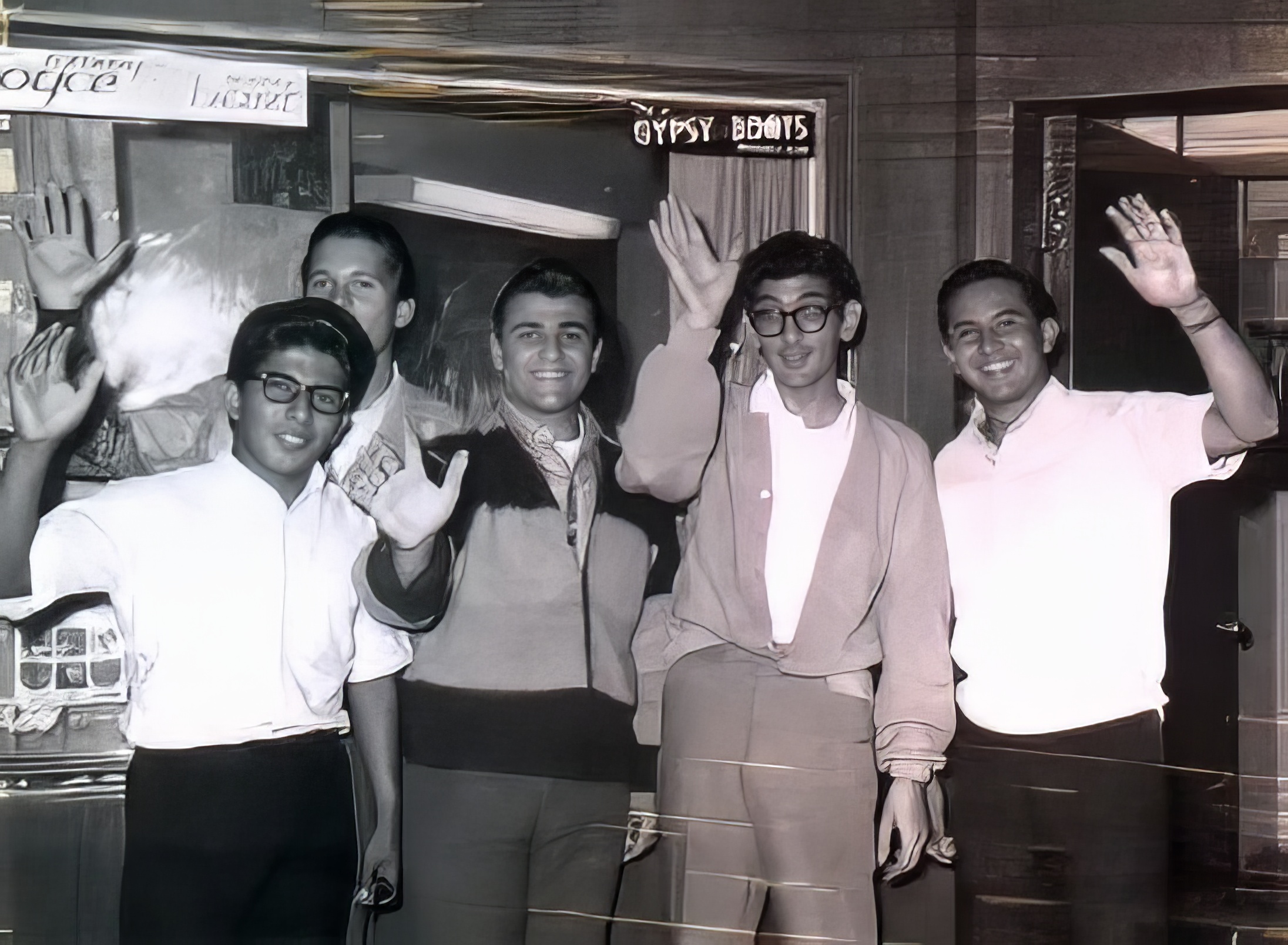
This photo is more suited to next week, when we really do say goodbye to the KRLA Tunedex project. Alas, this week's Tunedex must have been printed on festive holiday red paper because it scans completely grey from the photocopy we have of it. Do yourself a favor and go to Oldiesloon's site to find a readable transcription. Above you'll see Dick Biondi with the band he sponsored on some KRLA musical road trips, Mickey Aversa and the Invaders.
The Tunedex this week shows how thoroughly the U.S. music scene had embraced its many British invaders during 1964. The Supremes' "Come See About Me" is still at number one but not for long. The Beatles' "I Feel Fine"/"She's A Woman" is knocking at the door at number 2. Interesting that KRLA simply gave up trying to figure out which side would be *the* single and just listed the A and B side at the same position.
American artists like Bobby Vinton, The Righteous Brothers, Sonny & Cher, The Ronettes stand toe to toe with The Rolling Stones, Herman's Hermits, Chad & Jeremy, The Zombies, and Marianne Faithfull as they all dance up and down the Tunedex as if it was the most natural thing in the world.
By now, almost a year since "I Want To Hold Your Hand" shook the music industry to its roots, KRLA's radio mix is fresh and dynamic. We're on our way to an even better 1965 in terms of new acts, new songs, new groups from every part of the world. KRLA knew what its listeners wanted and they weren't afraid to go the extra mile for us.
And look quick or you'll miss him -- Brian Epstein's hope for the future, Tommy Quickly, makes his debut at number 50 with "The Wild Side of Life. This was about as wild as it would get for Mr. Quickly. Not even riding the coattails of the Fab Four could help him out.
See you next week for our final Tunedex of the year.
KRLA Tunedex, Dec 20-26, 1964
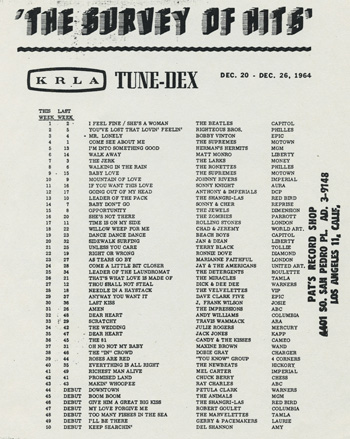
Back at the top of the Tunedex, where they always knew they'd be: The Beatles' newest single "I Feel Fine"/"She's A Woman." It's generally believed that the starting note, featuring Lennon's feedback from his Gibson J160e guitar, was the first such novelty ever used in rock-and-roll.
But this week's Tunedex, the last in our series, includes so much more. Old guard crooners like Matt Monro and Bobby Vinton, surf favorites like The Beach Boys and Jan & Dean, original Motown/Tamla artists galore, girl groups, the best of the British Invasion...it was all here fifty-nine years ago just as we were about to ring in the new year of 1965.
One poignant note was Del Shannon, a star in his own right who toured with the Beatles and was so impressed with a 1963 release of theirs that he recorded their number one "From Me To You" as a cover. In July 1963 it inched its way slowly into the number 32 position on the Tunedex, thus becoming one of the few early chart entries of a Beatles song. It was a signal of the musical maelstrom to come.
In "Keep Searchin'", a reworking of his big hit "Runaway," Del achieved his last great hit, debuting this week on the Tunedex at number 50. Hats off to Del!
The 1964 Tunedex project is at an end. It's been great to have you along for the ride. Please visit the KRLA Beat Blog, which will continue with Beat-related news and views on into the future.